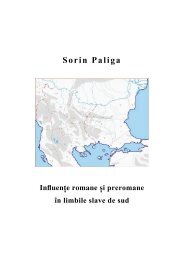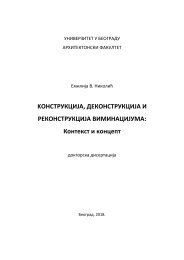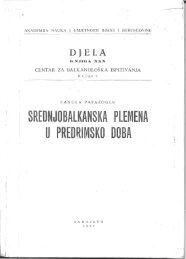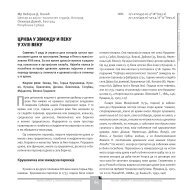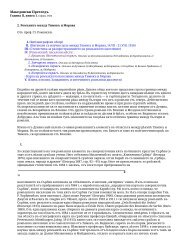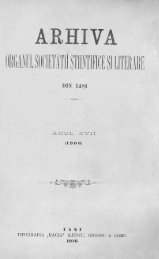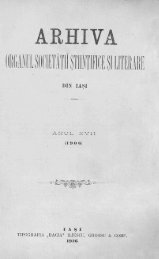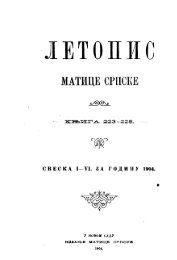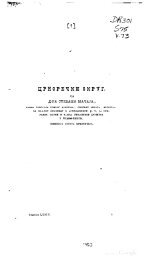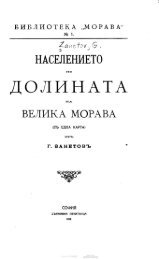Pismenost na rumunskom jeziku u Srbiji Romanian language literacy in Vojvodina and Eastern Serbia
Pismenost na rumunskom jeziku u Vojvodini i istočnoj Srbiji Romanian language literacy in Vojvodina and Eastern Serbia
Pismenost na rumunskom jeziku u Vojvodini i istočnoj Srbiji
Romanian language literacy in Vojvodina and Eastern Serbia
Create successful ePaper yourself
Turn your PDF publications into a flip-book with our unique Google optimized e-Paper software.
<strong>Romanian</strong> Language Literacy <strong>in</strong> Vojvodi<strong>na</strong><br />
<strong>and</strong> <strong>in</strong> <strong>Eastern</strong> <strong>Serbia</strong>. Premises <strong>and</strong> Consequences of<br />
L<strong>in</strong>guistic Languages <strong>and</strong> Political Dialects<br />
Maria<strong>na</strong> DAN,<br />
M<strong>in</strong>erva TRAJLOVIĆ-KONDAN <br />
Key-words: <strong>Romanian</strong> m<strong>in</strong>orities <strong>in</strong> <strong>Serbia</strong>, l<strong>in</strong>guistic <strong>language</strong>s <strong>and</strong> political<br />
dialects, <strong>literacy</strong>, identity<br />
1. Introduction<br />
Any human society is a l<strong>in</strong>guistic society; therefore, any l<strong>in</strong>guistic activity is a<br />
social activity. The comprehension of all the <strong>language</strong> facts or actions of a society<br />
takes a political shape (Guesp<strong>in</strong>, Marcellesi 1986: 9). Moreover, when we speak<br />
about multiethnic, multicultural surround<strong>in</strong>gs, the discussion about l<strong>in</strong>guistic politics<br />
is <strong>in</strong>evitable. The l<strong>in</strong>guistic policy consists of tak<strong>in</strong>g decisions concern<strong>in</strong>g the<br />
orientation <strong>and</strong> regulation of the <strong>language</strong> use for communication with<strong>in</strong> a state (on<br />
a <strong>na</strong>tio<strong>na</strong>l level), or for communication between different states (at an <strong>in</strong>ter<strong>na</strong>tio<strong>na</strong>l<br />
level), by us<strong>in</strong>g one, or more <strong>language</strong>s. The strategy for multil<strong>in</strong>gualism of the<br />
European Union (Saram<strong>and</strong>u, Nevaci 2009 ; Commission of the European<br />
Communities) stresses the fact that speak<strong>in</strong>g other <strong>language</strong>s <strong>and</strong> underst<strong>and</strong><strong>in</strong>g<br />
other cultures (at the <strong>na</strong>tio<strong>na</strong>l, as well as at the <strong>in</strong>ter<strong>na</strong>tio<strong>na</strong>l level), strengthens the<br />
connections between ethnically different <strong>in</strong>dividuals, different parts of Europe,<br />
while <strong>language</strong>s also represent the path that has to be followed for social <strong>in</strong>tegration<br />
<strong>and</strong> <strong>in</strong>tercultural dialogue. The l<strong>in</strong>guistic <strong>and</strong> cultural diversity, multil<strong>in</strong>gualism <strong>and</strong><br />
multiculturalism are the ma<strong>in</strong> European values. Although today we regard<br />
multil<strong>in</strong>gualism as a bridge between the different cultures, <strong>in</strong> the past some<br />
<strong>language</strong>s domi<strong>na</strong>ted <strong>and</strong> others were discrimi<strong>na</strong>ted aga<strong>in</strong>st, which, consequently,<br />
became assimilated, <strong>and</strong>, fi<strong>na</strong>lly ext<strong>in</strong>ct. Today’s European <strong>language</strong> policy focuses<br />
on the equal treatment of cultures <strong>and</strong> <strong>language</strong>s, which, be<strong>in</strong>g a many-sided issue<br />
discussed, for example, by Habermas (Habermas 2005), represents, <strong>in</strong> practice, a<br />
longer term process.<br />
The a<strong>na</strong>lysis of the situation of the m<strong>in</strong>ority <strong>language</strong>s <strong>in</strong> Europe is even more<br />
complex, as, start<strong>in</strong>g with the differences between ethnicity <strong>and</strong> <strong>na</strong>tion, between<br />
m<strong>in</strong>ority <strong>and</strong> majority, <strong>and</strong> <strong>in</strong> spite of the European Charter for Regio<strong>na</strong>l or M<strong>in</strong>ority<br />
Faculty of Philology, University of Belgrade, <strong>Serbia</strong>.<br />
„Philologica Jassyensia”, an XII, nr. 1 (23), 2016, p. 151–168
Maria<strong>na</strong> DAN, M<strong>in</strong>erva TRAJLOVIĆ-KONDAN<br />
Languages 1 , the equal treatment of <strong>language</strong>s <strong>and</strong> cultures still leaves to be desired;<br />
this is only part of the l<strong>in</strong>guistic policy as practically applied <strong>in</strong> certa<strong>in</strong><br />
circumstances even nowadays. It is <strong>in</strong> this respect that one can ponder upon the<br />
situation of the two <strong>Romanian</strong> m<strong>in</strong>orities liv<strong>in</strong>g <strong>in</strong> <strong>Serbia</strong>, which, although speak<strong>in</strong>g<br />
the same idiom of the <strong>Romanian</strong> <strong>language</strong>, have been treated differently <strong>in</strong> history,<br />
due to biased l<strong>in</strong>guistic policy. By draw<strong>in</strong>g a parallel between the situation of the<br />
<strong>Romanian</strong> m<strong>in</strong>ority from Vojvodi<strong>na</strong> <strong>and</strong> the <strong>Romanian</strong> m<strong>in</strong>ority from <strong>Eastern</strong><br />
<strong>Serbia</strong>, this paper will also reveal some of the consequences aris<strong>in</strong>g from the double<br />
st<strong>and</strong>ards applied <strong>in</strong> the l<strong>in</strong>guistic policy regard<strong>in</strong>g these m<strong>in</strong>orities.<br />
2.1. <strong>Romanian</strong> M<strong>in</strong>ority Language from Voivodi<strong>na</strong>, <strong>Romanian</strong><br />
M<strong>in</strong>ority Language from <strong>Eastern</strong> <strong>Serbia</strong> <strong>and</strong> Literary Text Reception<br />
In a previous paper (Dan, M<strong>in</strong>erva Trajlović-Kondan 2011), we have<br />
po<strong>in</strong>ted to the issues of the reception of the literary works of the <strong>Romanian</strong> m<strong>in</strong>ority<br />
of Vojvodi<strong>na</strong> (<strong>Serbia</strong>n Ba<strong>na</strong>t) by the majority culture of <strong>Serbia</strong> (the country <strong>in</strong> which<br />
the <strong>Romanian</strong> m<strong>in</strong>ority lives), <strong>and</strong> that of Romania (the country whose mother<br />
tongue this m<strong>in</strong>ority population uses). The concrete results of our research po<strong>in</strong>t to<br />
the fact that, while this <strong>Romanian</strong> m<strong>in</strong>ority has a multicultural profile, be<strong>in</strong>g<br />
acqua<strong>in</strong>ted with the literary texts of the majority population of both countries, due,<br />
<strong>in</strong> the first place, to the texts that are present <strong>in</strong> their textbooks, this is not the case<br />
with the majority populations of the two countries (<strong>Serbia</strong> <strong>and</strong> Romania), who are<br />
neither aware of, nor <strong>in</strong>terested <strong>in</strong>, the reception of writers of m<strong>in</strong>ority orig<strong>in</strong>. The<br />
conclusion is that neither the majority culture of <strong>Serbia</strong>, nor that of Romania has an<br />
adequate reception of literary texts belong<strong>in</strong>g to some of the most important<br />
m<strong>in</strong>ority <strong>Romanian</strong> writers of Vojvodi<strong>na</strong>, such as: Slavco Almăjan, Ioan Flora,<br />
Pavel Gătăianţu, etc.<br />
It is only the poet Vasko Popa, a <strong>Romanian</strong> <strong>na</strong>tive from Vojvodi<strong>na</strong>, who is<br />
present <strong>in</strong> both the <strong>Serbia</strong>n <strong>and</strong> <strong>Romanian</strong> majority cultures. The adequate reception<br />
of his poems <strong>in</strong> both majority cultures, as well as <strong>in</strong> the entire world, is probably<br />
enhanced by the fact that, although of <strong>Romanian</strong> m<strong>in</strong>ority ethnic orig<strong>in</strong>, Vasko Popa<br />
chose to write <strong>in</strong> the domi<strong>na</strong>nt culture <strong>na</strong>tio<strong>na</strong>l <strong>Serbia</strong>n <strong>language</strong> (called dur<strong>in</strong>g his<br />
life Serbo-Croatian, as the official <strong>language</strong> of ex-Yugoslavia). The same fact is true<br />
for the poet Adam Puslojić, of Vlach orig<strong>in</strong>, born <strong>in</strong> <strong>Eastern</strong> <strong>Serbia</strong>: he got to be<br />
known by his poetry written <strong>in</strong> the <strong>Serbia</strong>n majority population <strong>language</strong>, after<br />
which, when 51 years old, he started to write <strong>in</strong> <strong>Romanian</strong>, his mother tongue.<br />
Therefore, the reception of his literary works occurred separately <strong>in</strong> the two<br />
countries (<strong>Serbia</strong> <strong>and</strong> Romania), accord<strong>in</strong>g to the majority population <strong>language</strong> he<br />
used <strong>in</strong> his books of verse.<br />
Unlike the <strong>Romanian</strong> m<strong>in</strong>ority writers of Vojvodi<strong>na</strong>, Adam Puslojić is not<br />
present <strong>in</strong> the textbooks of the Vlachs of the <strong>Eastern</strong> <strong>Serbia</strong>, as this ethnic population<br />
1 “Regio<strong>na</strong>l or m<strong>in</strong>ority <strong>language</strong>s” means <strong>language</strong>s that are: traditio<strong>na</strong>lly used with<strong>in</strong> a given<br />
territory of a State by <strong>na</strong>tio<strong>na</strong>ls of that State who form a group numerically smaller than the rest of the<br />
State’s population; different from the official <strong>language</strong>(s) of that State; it does not <strong>in</strong>clude either<br />
dialects of the official <strong>language</strong>(s) of the State or the <strong>language</strong>s of migrants” (Council of Europe, 5. XI.<br />
1992; Andriescu, Mărăşoiu, Petraru)<br />
152
<strong>Romanian</strong> Language Literacy <strong>in</strong> Vojvodi<strong>na</strong> <strong>and</strong> <strong>in</strong> <strong>Eastern</strong> <strong>Serbia</strong><br />
has not had them at all until recently (2013), <strong>and</strong> as those textbooks are founded on<br />
the idiom of the <strong>Romanian</strong> <strong>language</strong> as spoken locally <strong>in</strong> <strong>Eastern</strong> <strong>Serbia</strong>, present<strong>in</strong>g<br />
no <strong>in</strong>terest either for enhanc<strong>in</strong>g the process of cognitive evolution of the children of<br />
this region <strong>in</strong> their mother tongue, or for broaden<strong>in</strong>g their horizons.<br />
The m<strong>in</strong>ority <strong>Romanian</strong> population of Vojvodi<strong>na</strong>, hav<strong>in</strong>g a multicultural<br />
profile, be<strong>in</strong>g acqua<strong>in</strong>ted to <strong>and</strong> aware of both majority cultures’ achievements, can<br />
be expla<strong>in</strong>ed by the fact that it has been tra<strong>in</strong>ed to have multicultural views, due to<br />
their education curricula <strong>and</strong> textbooks, issued <strong>in</strong> the <strong>Romanian</strong> <strong>language</strong> <strong>in</strong> <strong>Serbia</strong>.<br />
Although founded <strong>in</strong> the past on the communist notion of the ‘brotherhood <strong>and</strong><br />
unity’ (bratstvo i jed<strong>in</strong>stvo) of all <strong>na</strong>tio<strong>na</strong>lities liv<strong>in</strong>g together <strong>in</strong> ex-Yugoslavia, <strong>and</strong><br />
<strong>in</strong> spite of the ideological communist content of many of those texts, the textbooks<br />
used <strong>in</strong> schools by the <strong>Romanian</strong> <strong>na</strong>tio<strong>na</strong>l m<strong>in</strong>ority of Vojvodi<strong>na</strong> promoted the<br />
multicultural profile of the m<strong>in</strong>ority population, founded on its broad reception of its<br />
own cultural achievements, as well as of the achievements of the other majority <strong>and</strong><br />
m<strong>in</strong>ority cultures. As far as the <strong>Romanian</strong> m<strong>in</strong>ority of Vojvodi<strong>na</strong> is concerned, the<br />
relation between the domi<strong>na</strong>nt <strong>and</strong> non-domi<strong>na</strong>nt cultures has been acquired due to<br />
the schools <strong>and</strong> textbooks <strong>in</strong> their <strong>Romanian</strong> mother tongue, a comfortable solution<br />
– although, for the writers themselves belong<strong>in</strong>g to this m<strong>in</strong>ority, a broader reception<br />
of their works was possible only if they wrote <strong>in</strong> the <strong>language</strong> of the domi<strong>na</strong>nt<br />
culture.<br />
2.2. L<strong>in</strong>guistic Languages <strong>and</strong> Political Dialects<br />
Unlike the <strong>Romanian</strong> m<strong>in</strong>ority from Vojvodi<strong>na</strong>, the <strong>Romanian</strong> ethnic m<strong>in</strong>ority<br />
from <strong>Eastern</strong> <strong>Serbia</strong> was <strong>in</strong>cluded neither <strong>in</strong> an overall <strong>na</strong>tio<strong>na</strong>l cultural programme,<br />
nor <strong>in</strong> an educatio<strong>na</strong>l one <strong>in</strong> their mother tongue. The children from the l<strong>in</strong>guistic<br />
enclaves of <strong>Eastern</strong> <strong>Serbia</strong> were supposed to learn <strong>Serbia</strong>n (a <strong>language</strong> of Slavic<br />
orig<strong>in</strong>), the domi<strong>na</strong>nt culture <strong>language</strong>, before go<strong>in</strong>g to school. Only <strong>in</strong> that way<br />
were they able to attend education <strong>in</strong> the <strong>Serbia</strong>n <strong>language</strong> exclusively. Although<br />
speak<strong>in</strong>g the same idiom of the <strong>Romanian</strong> <strong>language</strong> as the m<strong>in</strong>ority of Vojvodi<strong>na</strong>,<br />
the children of <strong>Eastern</strong> <strong>Serbia</strong> have been deprived of the possibility to have<br />
textbooks <strong>in</strong> their mother tongue.<br />
S<strong>in</strong>ce the communist regimes were ext<strong>in</strong>ct <strong>in</strong> all <strong>Eastern</strong> Europe, the issue of<br />
the domi<strong>na</strong>nt <strong>and</strong> non-domi<strong>na</strong>nt cultures has changed, not only with respect to the<br />
<strong>Romanian</strong> m<strong>in</strong>ority from Vojvodi<strong>na</strong> <strong>and</strong>/or the one from <strong>Eastern</strong> <strong>Serbia</strong> as related to<br />
the <strong>Serbia</strong>n culture; it has, paradoxically, changed as a result of the transformations<br />
that took place with<strong>in</strong> the domi<strong>na</strong>nt Serbo-Croatian <strong>language</strong> <strong>and</strong> culture<br />
themselves. After the fall of communism <strong>and</strong> the fall<strong>in</strong>g apart of ex-Yugoslavia<br />
(Socialist Federative Republic of Yugoslavia), the <strong>Serbia</strong>n majority culture faced<br />
great problems itself – not be<strong>in</strong>g endangered <strong>in</strong> any way by the above mentioned<br />
<strong>Romanian</strong> <strong>na</strong>tio<strong>na</strong>l m<strong>in</strong>orities. As all cultures are founded, <strong>in</strong> the first place, on the<br />
<strong>language</strong> the respective community speaks, <strong>and</strong> as the majority population has been<br />
divided <strong>in</strong>to separate countries, the <strong>na</strong>me of the official <strong>language</strong> changed, accord<strong>in</strong>g<br />
to the claims of the countries that resulted after the collapse. The Serbo-Croatian<br />
<strong>language</strong> of ex-Yugoslavia does not exist any longer officially, although the<br />
population speaks exactly the same <strong>language</strong> as before. Accord<strong>in</strong>g to the newly<br />
153
Maria<strong>na</strong> DAN, M<strong>in</strong>erva TRAJLOVIĆ-KONDAN<br />
established <strong>in</strong>dependent <strong>and</strong> suzera<strong>in</strong> countries which ‘sprang up’ after the war <strong>in</strong><br />
the n<strong>in</strong>eties 90’s of the last century, the Serbo-Croatian <strong>language</strong> became: <strong>Serbia</strong>n,<br />
Croat, Bosnian (with its endeavor to differentiate the idioms of the ‘<strong>Serbia</strong>n’, ‘Croat’<br />
<strong>and</strong> ‘Muslim’ <strong>na</strong>tio<strong>na</strong>lities), Montenegr<strong>in</strong>… The ideological <strong>and</strong> identity factors<br />
promoted by the new countries seem to be one of the ma<strong>in</strong> aims of their cultural<br />
policy. Although, for example, German is still called German, both <strong>in</strong> Austria <strong>and</strong><br />
Germany, or Switzerl<strong>and</strong>, the <strong>na</strong>mes of the <strong>language</strong>s spoken <strong>in</strong> the new states<br />
resulted from the fall<strong>in</strong>g apart of Yugoslavia, usually follow ethnic, not l<strong>in</strong>guistic<br />
criteria. Although, <strong>in</strong> theory, globalization <strong>and</strong> democracy strive to multiculturalism,<br />
on the ground of ex-Yugoslavia the process is quite opposite, <strong>and</strong> based on<br />
differentiation. While the <strong>Romanian</strong> m<strong>in</strong>orities try to keep a multicultural profile,<br />
the domi<strong>na</strong>nt cultures have undergone a process of dissipation <strong>and</strong> separation.<br />
Ranko Bugarski concludes that ‘the Serbo-Croatian <strong>language</strong> exists <strong>and</strong> does not<br />
exist at the same time, depend<strong>in</strong>g on the level we approach it. (The fact that the<br />
adopted po<strong>in</strong>t of view def<strong>in</strong>es the very object of study has been <strong>in</strong>troduced <strong>in</strong>to<br />
l<strong>in</strong>guistics <strong>in</strong> the past, at least at the time of Ferdi<strong>na</strong>nd de Saussure). I usually<br />
summarise this pend<strong>in</strong>g situation [<strong>in</strong> ser. uslovno rečeno] by say<strong>in</strong>g that ‘today<br />
Serbo-Croatian is a l<strong>in</strong>guistic <strong>language</strong> <strong>in</strong> the shape of three political dialects’<br />
(Bugarski 2009: 123).<br />
Oppos<strong>in</strong>g l<strong>in</strong>guistic criteria to political dialects <strong>in</strong> the countries of ex-<br />
Yugoslavia has become an overall contemporary tendency. The <strong>Romanian</strong> l<strong>in</strong>guistic<br />
<strong>language</strong> spoken by the <strong>Romanian</strong> m<strong>in</strong>orities has been undergo<strong>in</strong>g the same process.<br />
Consequently, <strong>Romanian</strong> idioms belong<strong>in</strong>g to Vojvodi<strong>na</strong>, on the one h<strong>and</strong>, <strong>and</strong> to<br />
<strong>Eastern</strong> <strong>Serbia</strong> enclaves, on the other h<strong>and</strong>, have also been politically differentiated,<br />
although they are l<strong>in</strong>guistically <strong>and</strong> practically the same <strong>language</strong>.<br />
3. Political Agreements <strong>and</strong> Issues of Literacy: <strong>Romanian</strong> M<strong>in</strong>ority<br />
Language <strong>in</strong> Vojvodi<strong>na</strong> <strong>and</strong> <strong>in</strong> <strong>Eastern</strong> <strong>Serbia</strong> – a Parallel<br />
In the background mentioned above, both the <strong>Romanian</strong> ethnic m<strong>in</strong>ority of<br />
Vojvodi<strong>na</strong>, <strong>and</strong> the one of <strong>Eastern</strong> <strong>Serbia</strong> rema<strong>in</strong>ed with<strong>in</strong> the borders of the <strong>Serbia</strong>n<br />
domi<strong>na</strong>nt <strong>language</strong> <strong>and</strong> culture after ex-Yugoslavia fell apart. We agree with Ranko<br />
Bugarski that the underst<strong>and</strong><strong>in</strong>g of the situation of these m<strong>in</strong>orities depends on the<br />
very level from which we approach the <strong>Romanian</strong> <strong>language</strong> <strong>and</strong>/or the idioms<br />
spoken by these m<strong>in</strong>orities. Both <strong>in</strong> the case of the respective m<strong>in</strong>ority located <strong>in</strong><br />
Vojvodi<strong>na</strong>, <strong>and</strong> <strong>in</strong> <strong>Eastern</strong> <strong>Serbia</strong>, <strong>Romanian</strong>, as a l<strong>in</strong>guistic <strong>language</strong>, has been<br />
divided <strong>in</strong>to two political dialects; they were practically founded, s<strong>in</strong>ce the<br />
communist times, on the ma<strong>in</strong> criteria of ‘be<strong>in</strong>g allowed’, or ‘not be<strong>in</strong>g allowed’ to<br />
open schools <strong>and</strong> have textbooks <strong>in</strong> their mother tongue. (The same goes with<br />
open<strong>in</strong>g churches <strong>in</strong> one’s mother tongue, which is part of the same issue of political<br />
identity-formation).<br />
The <strong>Romanian</strong> m<strong>in</strong>ority of Vojvodi<strong>na</strong>, has got the right to open schools after<br />
The Convention Regard<strong>in</strong>g the Organization of M<strong>in</strong>ority Primary Schools <strong>in</strong> Ba<strong>na</strong>t<br />
(Popi 1996 : 284, Spăriosu 1992, Albert 2012) (Convenţia priv<strong>in</strong>d organizarea<br />
şcolilor primare m<strong>in</strong>oritare d<strong>in</strong> Ba<strong>na</strong>t), signed by the Yugoslav <strong>and</strong> the <strong>Romanian</strong><br />
sides <strong>in</strong> 1933, <strong>in</strong> which the two countries agreed, on a reciprocal basis, to open<br />
154
<strong>Romanian</strong> Language Literacy <strong>in</strong> Vojvodi<strong>na</strong> <strong>and</strong> <strong>in</strong> <strong>Eastern</strong> <strong>Serbia</strong><br />
schools for the ethnic m<strong>in</strong>ority of the other country. As both the <strong>Serbia</strong>n <strong>and</strong> the<br />
<strong>Romanian</strong> m<strong>in</strong>ority populations from the border region of Ba<strong>na</strong>t 2 , which was shared<br />
between Yugoslavia <strong>and</strong> Romania, were practically illiterate <strong>and</strong> did not have<br />
teachers <strong>and</strong> textbooks, later, the parts agreed to a transfer of some thirty teachers<br />
from one country to the other, who also helped with the curriculum <strong>and</strong> the<br />
textbooks. Moreover, dur<strong>in</strong>g the communist times, under the slogan of ‘brotherhood<br />
<strong>and</strong> unity’, the <strong>Romanian</strong> m<strong>in</strong>ority of the <strong>Serbia</strong>n Ba<strong>na</strong>t (Vojvodi<strong>na</strong>), was given the<br />
right to massively open schools <strong>in</strong> their mother tongue, to have a pr<strong>in</strong>t<strong>in</strong>g house,<br />
Libertatea, to issue books <strong>and</strong> magaz<strong>in</strong>es <strong>in</strong> their mother tongue – which was also,<br />
mutually, allowed to the <strong>Serbia</strong>n m<strong>in</strong>ority from the <strong>Romanian</strong> Ba<strong>na</strong>t. We will not<br />
discuss here the communist doctr<strong>in</strong>e, present <strong>in</strong> some of the issued texts, <strong>and</strong><br />
manuals on both sides. What matters here is the fact that that, although ma<strong>in</strong>ly<br />
agrarian, the <strong>Romanian</strong> ethnic population of Vojvodi<strong>na</strong> was allowed to get literate<br />
<strong>and</strong> to choose, if they wanted, to attend school either <strong>in</strong> their mother tongue, or <strong>in</strong><br />
Serbo-Croatian, as a consequence of the reciprocal Convention Regard<strong>in</strong>g the<br />
Organisation of M<strong>in</strong>ority Primary Schools <strong>in</strong> Ba<strong>na</strong>t, signed by the <strong>Romanian</strong> <strong>and</strong><br />
Yugoslav sides, for the benefit of their m<strong>in</strong>ority liv<strong>in</strong>g <strong>in</strong> the neighbor<strong>in</strong>g country –<br />
which is a political act, back<strong>in</strong>g up an ethno-l<strong>in</strong>guistic fact.<br />
The benefit at a cultural level for these populations, that of be<strong>in</strong>g <strong>in</strong>cluded <strong>in</strong>to<br />
a political agreement is, <strong>in</strong> the first place, <strong>literacy</strong> <strong>in</strong> their mother tongue. As a<br />
consequence, many other benefits can be mentioned, such as: the possibility to<br />
develop a multicultural, tolerant profile, the possibility to synchronize with Europe<br />
<strong>and</strong> the world. Gett<strong>in</strong>g updated by means of <strong>literacy</strong> <strong>in</strong> one’s mother tongue means,<br />
at an <strong>in</strong>dividual level, hav<strong>in</strong>g the opportunity to evolve as a human be<strong>in</strong>g, while, at<br />
an ethnic community level, it represents the possibility to escape enclavisation, to<br />
reach out to a modern world, founded on communication. Neither of those m<strong>in</strong>ority<br />
populations have ever caused any political trouble with<strong>in</strong> the domi<strong>na</strong>nt culture <strong>in</strong><br />
which they have lived. Today, the <strong>Romanian</strong> m<strong>in</strong>ority from Vojvodi<strong>na</strong> <strong>and</strong> the<br />
<strong>Serbia</strong>n m<strong>in</strong>ority from Romania can st<strong>and</strong> as positive examples of solv<strong>in</strong>g cultural<br />
<strong>and</strong> identity issues of m<strong>in</strong>orities by clever political agreements, which enhance<br />
<strong>literacy</strong> <strong>and</strong> fundamental human rights.<br />
Unlike the <strong>Romanian</strong> m<strong>in</strong>ority from Vojvodi<strong>na</strong>, the so called ‘Vlach’<br />
population from the East of <strong>Serbia</strong> was not given a choice, that is, it did not get the<br />
political <strong>and</strong> cultural privilege of hav<strong>in</strong>g schools opened <strong>in</strong> their <strong>Romanian</strong> mother<br />
tongue, nor any textbooks until 2013 – while open<strong>in</strong>g churches <strong>in</strong> their mother<br />
tongue is an issue with negative connotations <strong>and</strong> consequences even to this day.<br />
The <strong>in</strong>terest<strong>in</strong>g paradox is that both these <strong>Romanian</strong> ma<strong>in</strong>ly rural populations<br />
(from Vojvodi<strong>na</strong>, <strong>and</strong> from <strong>Eastern</strong> <strong>Serbia</strong>) speak at home the same idioms of<br />
<strong>Romanian</strong> <strong>language</strong> orig<strong>in</strong>; however, they are treated <strong>in</strong> a different manner by the<br />
majority population. In the case of the <strong>Romanian</strong> m<strong>in</strong>ority of Ba<strong>na</strong>t, the speeches are<br />
called: oltenesc, bănăţean, ardelenesc, that is, the speech origi<strong>na</strong>t<strong>in</strong>g from: Oltenia<br />
(the <strong>Romanian</strong> historical prov<strong>in</strong>ce of Wallachia), the speech of Ba<strong>na</strong>t, <strong>and</strong> the<br />
speech of Transylvania/Ardeal (which used to be part of the Austro-Hungarian<br />
2 Ba<strong>na</strong>t is a multiethnical border region, hav<strong>in</strong>g been divided between Romania <strong>and</strong> <strong>Serbia</strong> after the<br />
fall of the Austro-Hungarian Empire.<br />
155
Maria<strong>na</strong> DAN, M<strong>in</strong>erva TRAJLOVIĆ-KONDAN<br />
empire <strong>in</strong> the past). The so called Vlachs, who live <strong>in</strong> <strong>Eastern</strong> <strong>Serbia</strong>, accord<strong>in</strong>g to<br />
their speech, are of exactly the same orig<strong>in</strong> as the <strong>Romanian</strong> m<strong>in</strong>ority from<br />
Vojvodi<strong>na</strong>: Ţărani (com<strong>in</strong>g also from the historical prov<strong>in</strong>ce of Wallachia, called <strong>in</strong><br />
<strong>Romanian</strong> Ţara Românească), Ungureni (com<strong>in</strong>g also from Ba<strong>na</strong>t or Transylvania/<br />
Ardeal, which used to be under the rule of Austro-Hungarian empire) 3 . Us<strong>in</strong>g<br />
practically the same idioms of the <strong>Romanian</strong> <strong>language</strong>, the rural populations from<br />
Vojvodi<strong>na</strong> <strong>and</strong> <strong>Eastern</strong> <strong>Serbia</strong> were illiterate to the same extent at the beg<strong>in</strong>n<strong>in</strong>g of<br />
the 20 th century. However, it seems to be politics which decided whether to educate<br />
the representatives of these m<strong>in</strong>orities <strong>in</strong> their mother tongue, or not. It is politics<br />
that opposes political dialects to l<strong>in</strong>guistic criteria, try<strong>in</strong>g to promote new identities,<br />
which have not existed for centuries.<br />
Even today, the differences among the <strong>Romanian</strong> <strong>language</strong> idioms present <strong>in</strong><br />
Vojvodi<strong>na</strong> <strong>and</strong> <strong>in</strong> <strong>Eastern</strong> <strong>Serbia</strong> are practically non-existent <strong>and</strong> can be regarded<br />
only <strong>in</strong> terms of <strong>literacy</strong> <strong>in</strong>to one’s mother tongue: while the <strong>Romanian</strong> m<strong>in</strong>ority of<br />
Vojvodi<strong>na</strong> have a higher level of <strong>literacy</strong>, hav<strong>in</strong>g got a richer vocabulary as a result<br />
of education, the <strong>Romanian</strong> population of <strong>Eastern</strong> <strong>Serbia</strong>, who were not allowed<br />
<strong>literacy</strong> <strong>in</strong> their mother tongue, borrowed from <strong>Serbia</strong>n words denomi<strong>na</strong>t<strong>in</strong>g<br />
contemporary life style, especially words from the field of modern technology <strong>and</strong><br />
science.<br />
Nowadays, after the fall of the communism, when society has become<br />
democratic, the fact is that the <strong>Romanian</strong> m<strong>in</strong>ority of Vojvodi<strong>na</strong> cont<strong>in</strong>ues to have<br />
the <strong>in</strong>herited right to learn <strong>in</strong> schools <strong>in</strong> their mother tongue the st<strong>and</strong>ard <strong>Romanian</strong><br />
<strong>language</strong>, to have textbooks <strong>and</strong> written texts for the different subject matters, to<br />
have church service <strong>in</strong> their mother tongue – which are facts founded between the<br />
two World Wars <strong>and</strong> later supported by the communist regime, which gave them the<br />
right even to open a pr<strong>in</strong>t<strong>in</strong>g house <strong>and</strong> issue newspapers <strong>and</strong> magaz<strong>in</strong>es, as well. In<br />
the case of the <strong>Romanian</strong> m<strong>in</strong>ority of Vojvodi<strong>na</strong>, the argument that they did not<br />
have written texts <strong>in</strong> the <strong>Romanian</strong> st<strong>and</strong>ard <strong>language</strong> has not been <strong>in</strong>voked by the<br />
majority <strong>Serbia</strong>n population, while allow<strong>in</strong>g them to open schools <strong>and</strong> church<br />
service <strong>in</strong> their mother tongue. However, this argument has been, discrimi<strong>na</strong>t<strong>in</strong>gly,<br />
<strong>in</strong>voked with respect to the <strong>Romanian</strong>s of the <strong>Eastern</strong> <strong>Serbia</strong>, who were not allowed<br />
to open schools <strong>in</strong> their mother tongue until recently, nor to have church service <strong>in</strong><br />
<strong>Romanian</strong>.<br />
3 The <strong>language</strong> <strong>and</strong> the <strong>na</strong>tio<strong>na</strong>l costume, not to talk about other characteristics, clearly show that<br />
the <strong>Romanian</strong>s from this region origi<strong>na</strong>te from the different regions at the North of the Danube;<br />
therefore, the <strong>Romanian</strong>s from the Western mounta<strong>in</strong> region know that they have come from Hungaria,<br />
that is why they are called ungurjani, while the <strong>Romanian</strong>s of the <strong>Eastern</strong> part are called carani <strong>and</strong><br />
came from Tzara Romaneasca (romanian: Ţara Românească) (Valsan 2003: 109). Besides these two<br />
groups of Vlachs, there are another two of them – ungurjani – munćani <strong>and</strong> bufani. Ungurjani are the<br />
most numerous group of the <strong>Romanian</strong>s from the Timok river valley, <strong>and</strong> live <strong>in</strong> the region bordered by<br />
the rivers Zapad<strong>na</strong> Morava, Cr<strong>na</strong> reka, Du<strong>na</strong>v <strong>and</strong> Timok, <strong>and</strong> their speach is the most symilar to the<br />
the Ba<strong>na</strong>t <strong>Romanian</strong> speech. On the other h<strong>and</strong>, the speech of carani, who live <strong>in</strong> the region of Ključ<br />
<strong>and</strong> Negot<strong>in</strong>ska Kraji<strong>na</strong>, is similar to the <strong>Romanian</strong> dialect of Muntenia. Ungurjani – munćani are a<br />
mixture of carani <strong>and</strong> ungurjani, while the bufani live <strong>in</strong> the m<strong>in</strong><strong>in</strong>g town of Majdanpek. Besides these,<br />
there are also the băieşi, the m<strong>in</strong>ers, whose mother tongue is <strong>Romanian</strong>, <strong>and</strong> who live <strong>in</strong> the faraway<br />
localities of the Timok villages (Sorescu-Mar<strong>in</strong>ković 2012: 28).<br />
156
<strong>Romanian</strong> Language Literacy <strong>in</strong> Vojvodi<strong>na</strong> <strong>and</strong> <strong>in</strong> <strong>Eastern</strong> <strong>Serbia</strong><br />
3.1. <strong>Romanian</strong> Language <strong>in</strong> Curricula <strong>and</strong> Textbooks <strong>in</strong> <strong>Eastern</strong> <strong>Serbia</strong>.<br />
Models of a ‘Newly-Born’ Language<br />
The recommendations regard<strong>in</strong>g m<strong>in</strong>orities <strong>in</strong> <strong>Serbia</strong> are optimistic: “Council<br />
of Europe Committee of M<strong>in</strong>isters calls upon <strong>Serbia</strong> to provide teach<strong>in</strong>g <strong>in</strong>/of all the<br />
m<strong>in</strong>ority <strong>language</strong>s at all levels, strengthen the teacher tra<strong>in</strong><strong>in</strong>g <strong>and</strong> provide adequate<br />
teach<strong>in</strong>g materials” (Concil of Europe 2013). Hovever, facts show differently. We<br />
have had the opportunity to leaf through the newly issued manual of ‘<strong>Romanian</strong><br />
<strong>language</strong> with elements of <strong>na</strong>tio<strong>na</strong>l culture’, dedicated to the children of <strong>Eastern</strong><br />
<strong>Serbia</strong>. St<strong>and</strong>ard <strong>Romanian</strong> be<strong>in</strong>g avoided (which is not the case of the <strong>Romanian</strong><br />
<strong>language</strong> taught <strong>in</strong> Vojvodi<strong>na</strong>), some strange texts have been issued, entitled, for<br />
example: “P<strong>and</strong>a învacă kung-fu” (P<strong>and</strong>a learns kung-fu). Those texts have been<br />
obviously produced by authors who are neither philologists, nor teachers by<br />
profession, although the respective textbook is supposed to be used by university<br />
educated teachers <strong>in</strong> the process of teach<strong>in</strong>g. In order to illustrate the situation, as<br />
transposed <strong>in</strong>to English, imag<strong>in</strong>e a textbook written <strong>in</strong> an idiom of the English<br />
<strong>language</strong>, let’s say, a cockney English manual, half written <strong>in</strong> the Lat<strong>in</strong> alphabet,<br />
half <strong>in</strong> the Cyrillic, <strong>in</strong> which the same words, denomi<strong>na</strong>t<strong>in</strong>g the same th<strong>in</strong>g, are<br />
written differently, <strong>in</strong> the same textbook, etc. The <strong>in</strong>tention of this textbook is,<br />
probably – at least judg<strong>in</strong>g by the title of the object of study (‘<strong>Romanian</strong> <strong>language</strong><br />
with elements of <strong>na</strong>tio<strong>na</strong>l culture’) – supposed to support <strong>and</strong> preserve the<br />
anonymous oral cultural ‘legacy’ of the ‘Vlach’ rural tradition from immemorial<br />
times as ‘<strong>na</strong>tio<strong>na</strong>l culture’ <strong>and</strong> present it to the children of <strong>Eastern</strong> <strong>Serbia</strong> of today.<br />
However, the ‘tradition’ becomes here the subjective creation of its utterly<br />
<strong>in</strong>competent authors, who were probably not <strong>in</strong>terested themselves <strong>in</strong> gett<strong>in</strong>g literate<br />
<strong>in</strong> their own mother tongue, or they couldn’t. After all, what is the character P<strong>and</strong>a<br />
representative for, as far as the <strong>Romanian</strong> tradition of <strong>Eastern</strong> <strong>Serbia</strong> is concerned?<br />
The same question can be asked about ‘kung-fu’. Moreover, the adopted form of<br />
writ<strong>in</strong>g, cannot be found <strong>in</strong> any software, <strong>and</strong> looks like a ciphered writ<strong>in</strong>g code, <strong>in</strong><br />
which the letters ‘î’ <strong>and</strong> ‘ă’ are taken from the <strong>Romanian</strong> alphabet, while the<br />
<strong>Romanian</strong> letter ‘ţ’ is replaced by ‘c’. Therefore, the text can be read only by a<br />
person who is both literate <strong>and</strong> fluent <strong>in</strong> <strong>Romanian</strong> (level C1 <strong>and</strong> C2), <strong>and</strong> <strong>in</strong> the<br />
course of read<strong>in</strong>g it, the person can ’guess’ the real words, by notic<strong>in</strong>g the utter<br />
mistakes made by the text authors. If we are well-meant, we can ask ourselves if the<br />
authors <strong>in</strong>tended to make a sort of <strong>in</strong>novatio<strong>na</strong>l experiment with the children from<br />
<strong>Eastern</strong> <strong>Serbia</strong>, as if they were gu<strong>in</strong>ea pigs – which is u<strong>na</strong>cceptable, cruel <strong>and</strong> sad at<br />
the same time. What other conclusion can one draw <strong>in</strong> such circumstances of<br />
experiment<strong>in</strong>g not only with orthography, but with human rights as well? Not only<br />
does the textbook lack <strong>in</strong> literate texts, but it also lacks <strong>in</strong> relevance, both <strong>in</strong> the field<br />
of tradition <strong>and</strong> <strong>in</strong>novation. Moreover, it lacks a cultural orientation, a cultural<br />
framework <strong>and</strong> pedagogical methodology.<br />
Any possibility of teach<strong>in</strong>g the children from <strong>Eastern</strong> <strong>Serbia</strong> someth<strong>in</strong>g new<br />
<strong>and</strong> valuable <strong>in</strong> their mother tongue is excluded. On the contrary, ‘The Tales for<br />
Children’, <strong>in</strong> the very title, are the first time mentioned as ‘Повјестјиј дје копиј’<br />
157
Maria<strong>na</strong> DAN, M<strong>in</strong>erva TRAJLOVIĆ-KONDAN<br />
[povjestjij dje kopij] 4 , <strong>and</strong> the second time (the same title) as ‘Povješć dî kopij’ 5 –<br />
the tales, as a genu<strong>in</strong>e children’s nightmare, for which the grown-up authors have no<br />
excuse. As there is no expla<strong>na</strong>tion why the Lat<strong>in</strong> alphabet is mixed up with the<br />
Cyrillic one, while teach<strong>in</strong>g a <strong>language</strong> of Lat<strong>in</strong> orig<strong>in</strong> – <strong>and</strong> even do<strong>in</strong>g so, why the<br />
same words are presented with a different pronunciation (<strong>in</strong> the Cyrillic <strong>and</strong> <strong>in</strong> the<br />
Lat<strong>in</strong> alphabet respectively) <strong>in</strong> the same textbook title? Does this situation show any<br />
good will to synchronize this ethnic community with the rest of the world, as it was<br />
the case with the <strong>Romanian</strong> m<strong>in</strong>ority from Vojvodi<strong>na</strong>? How can one possibly talk<br />
about democratic st<strong>and</strong>ards <strong>in</strong> education, <strong>and</strong> not of discrimi<strong>na</strong>tion, if the solution<br />
was found for the education of the <strong>in</strong>itially illiterate <strong>Romanian</strong> m<strong>in</strong>ority of<br />
Vojvodi<strong>na</strong> <strong>in</strong> the thirties of the last century, while, for the <strong>Romanian</strong> population of<br />
<strong>Eastern</strong> <strong>Serbia</strong>, speak<strong>in</strong>g the same idioms of the <strong>Romanian</strong> <strong>language</strong>, it has not been<br />
found yet?<br />
Hav<strong>in</strong>g been deprived of school education <strong>in</strong> their mother tongue, of <strong>literacy</strong>,<br />
that is, hav<strong>in</strong>g been deprived of the possibility of l<strong>in</strong>guistic <strong>and</strong> cultural evolution<br />
<strong>and</strong> synchronization with the contemporary world, the <strong>Romanian</strong>s from <strong>Eastern</strong><br />
<strong>Serbia</strong> have been left to live <strong>in</strong> ethno-l<strong>in</strong>guistic enclaves, to use an archaic/popular<br />
<strong>Romanian</strong> <strong>language</strong> with Slavic neologisms at home. Therefore, unlike the<br />
<strong>Romanian</strong> m<strong>in</strong>ority from Vojvodi<strong>na</strong>, the <strong>Romanian</strong>s from <strong>Eastern</strong> <strong>Serbia</strong> have been<br />
largely assimilated by the majority <strong>Serbia</strong>n population. Although there is practically<br />
no difference between the <strong>Romanian</strong> idiom from Voivodi<strong>na</strong> <strong>and</strong> that from the<br />
<strong>Eastern</strong> <strong>Serbia</strong>, except for the degree of the speakers’ <strong>literacy</strong> <strong>in</strong> their mother tongue,<br />
the l<strong>in</strong>guistic <strong>and</strong> cultural policy of the majority population is <strong>in</strong>cl<strong>in</strong>ed to def<strong>in</strong>e the<br />
<strong>Romanian</strong> idiom from <strong>Eastern</strong> <strong>Serbia</strong> as a quite different ‘<strong>language</strong>’: a ‘new’<br />
<strong>language</strong> of non-<strong>Romanian</strong> identity. Is the <strong>Romanian</strong> idiom spoken <strong>in</strong> <strong>Eastern</strong> <strong>Serbia</strong><br />
really a different l<strong>in</strong>guistic <strong>language</strong>, requir<strong>in</strong>g even the <strong>in</strong>vention of a new alphabet<br />
<strong>and</strong> orthography, or is it a new ‘political dialect’, enhanc<strong>in</strong>g a new, <strong>Serbia</strong>n, identity<br />
of its speakers? If the Serbo-Croat l<strong>in</strong>guistic identity (of ex-Yugoslavia) fell apart<br />
<strong>in</strong>to more ‘political dialects’ (as R. Bugarski puts it), this seems to be the case of the<br />
<strong>Romanian</strong> idiom spoken <strong>in</strong> <strong>Eastern</strong> <strong>Serbia</strong>. Ironically, the policy of assimilation is,<br />
probably, the only expla<strong>na</strong>tion why dur<strong>in</strong>g the classes of ‘<strong>Romanian</strong> <strong>language</strong> with<br />
elements of <strong>na</strong>tio<strong>na</strong>l culture’, the children from <strong>Eastern</strong> <strong>Serbia</strong> are taught about<br />
‘P<strong>and</strong>a’ <strong>and</strong> ‘kung-fu’.<br />
3.2. Criteria for <strong>Romanian</strong> Natio<strong>na</strong>l M<strong>in</strong>orities Textbooks<br />
It is obvious that the criteria for choos<strong>in</strong>g the texts for the <strong>Romanian</strong> m<strong>in</strong>ority<br />
of Vojvodi<strong>na</strong> <strong>and</strong> those for <strong>Eastern</strong> <strong>Serbia</strong> are different. The difference is cultural<br />
4 Lat<strong>in</strong> alphabet transcription of the Cyrillic – shows that the title written <strong>in</strong> Cyrrilic, by the<br />
textbook authors, does not match the same title the authors wrote <strong>in</strong> the Lat<strong>in</strong> alphabet (Marian Dan<br />
<strong>and</strong> M<strong>in</strong>erva Trajlović-Kondan).<br />
5 Ordi<strong>na</strong>nce amend<strong>in</strong>g the Ordi<strong>na</strong>nce on the Curriculum for the 4 th grade of primary education,<br />
Vlach Language with Elements of Natio<strong>na</strong>l Culture, Belgrade, 18 th August, 2014<br />
(http://slglasnik.<strong>in</strong>fo/sr/11-2014-20-08-2014-prosvetni-glasnik-6/25427-pravilnik-o-dopuni-pravilnikao-<strong>na</strong>stavnom-programu-za-cetvrti-razred-osnovnog-obrazovanja-i-vaspitanja.html).<br />
158
<strong>Romanian</strong> Language Literacy <strong>in</strong> Vojvodi<strong>na</strong> <strong>and</strong> <strong>in</strong> <strong>Eastern</strong> <strong>Serbia</strong><br />
policy, or assimilation. In the first case, the <strong>Romanian</strong> <strong>language</strong> <strong>and</strong> culture are<br />
presented with<strong>in</strong> the <strong>in</strong>evitable process of evolution, which is necessarily <strong>and</strong><br />
ceaselessly go<strong>in</strong>g on <strong>in</strong> each <strong>and</strong> every <strong>na</strong>tion. The aim of the respective textbooks is<br />
to update the children, e<strong>na</strong>bl<strong>in</strong>g them to make the reception not only of literary texts,<br />
but also of texts conta<strong>in</strong><strong>in</strong>g notions perta<strong>in</strong><strong>in</strong>g to the modern sciences, represented <strong>in</strong><br />
schools by the different objects of study <strong>in</strong> their mother tongue. In the second case,<br />
the exist<strong>in</strong>g textbooks <strong>and</strong> curricula view the <strong>Romanian</strong> <strong>language</strong> <strong>and</strong> folklore<br />
traditions as static <strong>and</strong> dead phenome<strong>na</strong>, which must be preserved as such, as today<br />
‘we have fi<strong>na</strong>lly become aware’ that we are deal<strong>in</strong>g with valuable cultural facts,<br />
undergo<strong>in</strong>g a process of ext<strong>in</strong>ction. Although ext<strong>in</strong>ction goes h<strong>and</strong> <strong>in</strong> h<strong>and</strong> with the<br />
policy of assimilation, <strong>and</strong> although ‘the Vlachs’ from <strong>Eastern</strong> <strong>Serbia</strong> were not<br />
allowed to open schools <strong>and</strong> churches <strong>in</strong> their mother tongue, they are made<br />
responsible for their not hav<strong>in</strong>g produced written texts <strong>in</strong> their mother tongue…<br />
However, the rural <strong>Romanian</strong> m<strong>in</strong>ority of Vojvodi<strong>na</strong> had not produced texts <strong>in</strong> their<br />
mother tongue either <strong>and</strong>, still, it was allowed proper education <strong>in</strong> their mother<br />
tongue. The textbooks of Vojvodi<strong>na</strong> have had normal textbooks, suited to the<br />
vocabulary of each subject matter (as the majority population textbooks are). Even<br />
children belong<strong>in</strong>g to the majority population learn modern, scientific term<strong>in</strong>ology,<br />
which is one of the reasons why they are supposed to attend school. In this case, the<br />
argument that the <strong>Romanian</strong>s from <strong>Eastern</strong> <strong>Serbia</strong> did not have a written <strong>language</strong><br />
cannot st<strong>and</strong> either. It is not necessary to produce literary auctorial written works <strong>in</strong><br />
order to be allowed to attend the contemporary subject matters <strong>in</strong> one’s mother<br />
tongue. Compar<strong>in</strong>g the textbooks of the majority <strong>Serbia</strong>n population, <strong>and</strong> the<br />
textbooks of the <strong>Romanian</strong> m<strong>in</strong>ority of Vojvodi<strong>na</strong>, the textbooks from <strong>Eastern</strong><br />
<strong>Serbia</strong> seem to be a biased <strong>and</strong> <strong>in</strong>competent mockery, as shown above. Nowadays,<br />
hav<strong>in</strong>g got university education themselves, teachers of <strong>Romanian</strong> tend to use, <strong>in</strong><br />
their pedagogic practice, the manuals from Vojvodi<strong>na</strong> to teach the children from<br />
<strong>Eastern</strong> <strong>Serbia</strong>, as the officially issued textbooks for this population are not<br />
practicable.<br />
3.3. The Issues of Language, Cognition <strong>and</strong> the Subject Matters as Texts<br />
All textbooks for children, whether the majority or the m<strong>in</strong>ority population is<br />
concerned, should envisage the fact that reality undergoes a constant process of<br />
change, which is <strong>in</strong>evitably conta<strong>in</strong>ed <strong>in</strong> the <strong>language</strong>. In this process, <strong>language</strong> is a<br />
cognitio<strong>na</strong>l <strong>in</strong>strument. The ‘new, cognitive conception of learn<strong>in</strong>g can guide future<br />
research on both learn<strong>in</strong>g <strong>and</strong> <strong>in</strong>struction’ (Shuell 1986: 411). If one is illiterate <strong>in</strong><br />
one’s mother tongue, this does not only mean that the person does not possess the<br />
skill of read<strong>in</strong>g <strong>and</strong> writ<strong>in</strong>g, but it also means that the respective person has got a<br />
differently structured cognition of the world. S<strong>in</strong>ce it is by <strong>language</strong> that we expla<strong>in</strong><br />
‘reality,’ the cognitio<strong>na</strong>l function of <strong>language</strong> is fundamental. With the evolution of<br />
science <strong>and</strong> man’s access to it by education <strong>and</strong> mass-media, man’s cognition also<br />
evolves. We go to school <strong>in</strong> order to broaden <strong>and</strong> deepen our cognition of the world,<br />
to get <strong>in</strong>formed about an updated notion about ‘reality’.<br />
In today’s globalist <strong>and</strong> democratic society the school<strong>in</strong>g system provid<strong>in</strong>g<br />
cognition by means of one’s mother tongue is a fundamental human right. No matter<br />
159
Maria<strong>na</strong> DAN, M<strong>in</strong>erva TRAJLOVIĆ-KONDAN<br />
its ethnic orig<strong>in</strong>, any child goes to school to become at least ‘literate’, not only with<br />
regard to the orthographic conventions of a certa<strong>in</strong> <strong>language</strong>, but <strong>in</strong> order to get<br />
updated about the contemporary ‘reality’, reflected <strong>in</strong>to his subject matters. As the<br />
evolution of <strong>language</strong> goes <strong>in</strong> parallel with the evolution of science, of the human<br />
society, of the view of the world, it is only by gett<strong>in</strong>g education <strong>in</strong> one’s mother<br />
tongue, founded on contemporary scientific texts, as subject matters, that the child<br />
becomes an equal citizen of the modern world. And those ‘scientific’ words are not<br />
a <strong>na</strong>tion’s privilege, but are common <strong>in</strong>ter<strong>na</strong>tio<strong>na</strong>l words, the Vlach children should<br />
benefit from them, as the <strong>Romanian</strong> m<strong>in</strong>ority from Vojvodi<strong>na</strong> does, as well as the<br />
majority <strong>Serbia</strong>n population. The reception of such texts is a ‘must needs’ category<br />
for the manuals written for the children of <strong>Eastern</strong> <strong>Serbia</strong> <strong>in</strong> their mother tongue, if<br />
we respect them <strong>and</strong> care for their evolution.<br />
4. Stages of Literacy <strong>and</strong> World Cognition<br />
If one tries to look at <strong>language</strong>s synchronically, that is <strong>in</strong> a certa<strong>in</strong> moment of<br />
their evolution, one can state that, roughly speak<strong>in</strong>g, each <strong>na</strong>tion has gotthree<br />
forms/aspects of <strong>language</strong>: 1. the popular <strong>language</strong>, as spoken by the people who<br />
did not attend school, which is very vivid, but has got reduced means of expression;<br />
2. The common <strong>language</strong>, as it is usually spoken <strong>in</strong> towns, with richer means of<br />
expression, <strong>and</strong> 3. The literary <strong>language</strong>, used ma<strong>in</strong>ly by <strong>in</strong>tellectuals, express<strong>in</strong>g<br />
subtler notions <strong>and</strong> sophisticated thoughts, reflect<strong>in</strong>g higher education (Capidan<br />
1943: 4). While the majority communities of the East European countries have got<br />
the three aspects of their <strong>language</strong>s mentioned above, as they have text books <strong>in</strong><br />
schools for the different subject matters <strong>in</strong> the respective majority population mother<br />
tongue, this is not the case with all the m<strong>in</strong>ority community <strong>language</strong>s.<br />
In other words, the <strong>in</strong>dividuals belong<strong>in</strong>g to the majority <strong>Serbia</strong>n population<br />
can choose if they want to have broader <strong>language</strong> possibilities, which means, as we<br />
have shown, wider horizons of th<strong>in</strong>k<strong>in</strong>g <strong>and</strong> cognition, or they are satisfied to stop<br />
their education at a certa<strong>in</strong> level. Although the European democratic society of today<br />
should give all <strong>in</strong>dividuals equal chances <strong>in</strong> hav<strong>in</strong>g education <strong>and</strong> textbooks for the<br />
different subject matters <strong>in</strong> their mother tongue, the <strong>Romanian</strong> population from<br />
<strong>Eastern</strong> <strong>Serbia</strong> has been left beh<strong>in</strong>d <strong>in</strong> this process of synchronization with the<br />
global science <strong>and</strong> culture <strong>in</strong> their mother tongue. Their form of speech can be only<br />
the popular one, used <strong>in</strong> childhood, at home, <strong>in</strong> their l<strong>in</strong>guistic ‘enclave’. ‘Their’<br />
only ‘choice’ is to have one preparatory year before attend<strong>in</strong>g school, dur<strong>in</strong>g which<br />
they learn <strong>Serbia</strong>n, the majority population <strong>language</strong> <strong>in</strong> order to achieve <strong>literacy</strong>. As<br />
the evolution of the <strong>language</strong> goes h<strong>and</strong> <strong>in</strong> h<strong>and</strong> with the evolution of human<br />
society, the children that live <strong>in</strong> l<strong>in</strong>guistic enclaves <strong>and</strong> do not have schoolbooks <strong>in</strong><br />
their mother tongue are compelled to rema<strong>in</strong> further on <strong>in</strong> backward societies, unless<br />
they decide to change their identity by study<strong>in</strong>g <strong>in</strong> the <strong>language</strong> of the domi<strong>na</strong>nt<br />
culture, which they are compelled to learn before attend<strong>in</strong>g school.<br />
In the discussion about <strong>literacy</strong> there is another aspect, which has been rarely<br />
mentioned, as a very delicate perso<strong>na</strong>l question is related to it: the complex of<br />
<strong>in</strong>feriority of the illiterate person belong<strong>in</strong>g to an ethnic m<strong>in</strong>ority group. We usually<br />
hear how wonderful a popular <strong>language</strong> <strong>and</strong> ethnic culture heritage is <strong>and</strong> this<br />
160
<strong>Romanian</strong> Language Literacy <strong>in</strong> Vojvodi<strong>na</strong> <strong>and</strong> <strong>in</strong> <strong>Eastern</strong> <strong>Serbia</strong><br />
statement is always related to the wonderfully preserved folkloric traditions <strong>in</strong> the<br />
enclaves. In fact, the literate people mock at the illiterate ones. The reason for<br />
mock<strong>in</strong>g at them is not so much the ‘funny’ popular <strong>language</strong> they use, but the<br />
unscientific, cognitive approach. Below is a quotation from a recent <strong>Serbia</strong>n<br />
magaz<strong>in</strong>e text, <strong>in</strong> which the jour<strong>na</strong>list f<strong>in</strong>ds hilarious the fact that illiterate <strong>Serbia</strong>n<br />
peasants (who probably chose not to go to school, although it was their right <strong>and</strong><br />
obligation), liv<strong>in</strong>g some 40 km away from the <strong>Serbia</strong>n town of Valjevo, believe <strong>in</strong><br />
the miraculous ‘quantum fields’ of energy (with no scientific proof), able to cure<br />
sciatic nerve pa<strong>in</strong>. Not only does the peasant believe <strong>in</strong> the miraculous ‘heal<strong>in</strong>g<br />
power’ of what he himself calls ‘quantum fields’, but he also uses distorted words,<br />
phrases lack<strong>in</strong>g logic, rang<strong>in</strong>g <strong>in</strong> a sort of an avalanche of hilarious argumentation.<br />
Moreover, the jour<strong>na</strong>list’s text reveals to what extend il<strong>literacy</strong> <strong>in</strong> one’s mother<br />
tongue reflects the close relation between <strong>in</strong>correct talk<strong>in</strong>g <strong>and</strong> i<strong>na</strong>ppropriate<br />
th<strong>in</strong>k<strong>in</strong>g:<br />
Ali, razgovoru nikad kraja, pristigli seljak iz Dre<strong>na</strong>jića, veli da je staj’o prošle<br />
god<strong>in</strong>e [u energetskim polima], izlečio se, bio ga pritisk’o išijak, odavde, dovde,<br />
prim’o ’nekcije, trošio praškove, ništa, doneli ga u čaršavu, kad izaš’o iz polja odma’<br />
seo <strong>na</strong> traktor, nest’o išijak, prestali žigovi. A šta nije vidio, za jednu, kad je vidio<br />
kakva je, rek’o da ni Amerika ne može da je izleči, eno je, ’vala bogu, oda, bio i o<strong>na</strong>j<br />
što bio ko sveća, lepši ima u kapeli kad umru, bio sav skvrćen, ispravio se čovek,<br />
tražio da mu donese kilo rakije, doneo... Kad novi<strong>na</strong>r krenuo, Profesor i za njega<br />
izvadi antenu, ante<strong>na</strong> se zavrti, iz prve pogodi, kosti, zglobovi, i propisa 12 nedelja<br />
terapije (Todorović, 2015, 66). [Our conversation went on forever, “I stood <strong>in</strong> it [the<br />
energy field] a year back”, swore the peasant from Dre<strong>na</strong>jića, “<strong>and</strong> cured myself. I<br />
had the sciatica bad, from here to here. They gave me jabs, powders, but noth<strong>in</strong>g<br />
helped, so they carried me up here <strong>in</strong> a sheet, <strong>and</strong> as soon as I came out of the energy<br />
field, I got right up on me tractor. The sciatica was gone,” he cont<strong>in</strong>ued “<strong>and</strong> the<br />
t<strong>in</strong>gl<strong>in</strong>g was gone. And I’ve seen many such cases, a woman, when he saw her, he<br />
said that even America couldn’t cure her, but look at her now, thanks God, she can<br />
walk now, <strong>and</strong> there was the guy who was like a c<strong>and</strong>le, you can f<strong>in</strong>d better look<strong>in</strong>g<br />
people at the morgue when they’re dead, he was all shriveled up, but the man got<br />
right <strong>and</strong> asked for a bottle of liquor, I brought it…” “Then the jour<strong>na</strong>list started, the<br />
Professor took out his anten<strong>na</strong> too, <strong>and</strong> the anten<strong>na</strong> started turn<strong>in</strong>g round, he figured<br />
out straight away what was wrong, the bones, the jo<strong>in</strong>ts, <strong>and</strong> he made a prescription<br />
for 12 weeks of therapy”].<br />
The quotation above is a vivid example for the <strong>in</strong>terrelation between <strong>language</strong><br />
<strong>literacy</strong> <strong>and</strong> cognition, <strong>and</strong> it po<strong>in</strong>ts to the importance of attend<strong>in</strong>g schools <strong>in</strong> one’s<br />
mother tongue, <strong>in</strong> which at least elementary scientific notions should be given, no<br />
matter if one’s mother tongue belongs to the majority or m<strong>in</strong>ority ethnic group. The<br />
po<strong>in</strong>t is that the majority <strong>Serbia</strong>n ethnic <strong>language</strong> community <strong>and</strong> the <strong>Romanian</strong>s<br />
from Vojvodi<strong>na</strong> have been given the possibility <strong>and</strong> the choice to improve their<br />
<strong>language</strong> skills <strong>and</strong>, at the same time, acquire contemporary cognition of the world –<br />
if they want to; they have had textbooks for the different subject matters. As far as<br />
the <strong>Romanian</strong>s from <strong>Eastern</strong> <strong>Serbia</strong> are concerned, a discrimi<strong>na</strong>t<strong>in</strong>g policy is still<br />
applied, as their only chance to become literate is by renounc<strong>in</strong>g their mother<br />
tongue, that is – renounc<strong>in</strong>g their identity. If the <strong>Romanian</strong> population from <strong>Eastern</strong><br />
161
Maria<strong>na</strong> DAN, M<strong>in</strong>erva TRAJLOVIĆ-KONDAN<br />
<strong>Serbia</strong> rema<strong>in</strong>s illiterate, such i<strong>na</strong>dequate ways of th<strong>in</strong>k<strong>in</strong>g rema<strong>in</strong> a probability, not<br />
only a possibility. Can we, then, speak of the ‘beauty’ of the Vlach folklore <strong>and</strong> their<br />
well-known magic <strong>and</strong> ‘spells’, while we do not allow them to get literate <strong>in</strong> their<br />
mother tongue? Are we c<strong>and</strong>id when we say that we appreciate their tradition, or<br />
their ‘traditio<strong>na</strong>l’ way of th<strong>in</strong>k<strong>in</strong>g, which might be as hilarious as the case of the<br />
illiterate Serb mentioned above? Can we, therefore, assert that such ‘folklore’ ways<br />
of cognition are ‘characteristic’ of the entire <strong>Romanian</strong> population of <strong>Eastern</strong> <strong>Serbia</strong>,<br />
unless it gets assimilated by attend<strong>in</strong>g <strong>Serbia</strong>n schools, where they acquire a<br />
modern, updated cognition of the world? The children from <strong>Eastern</strong> <strong>Serbia</strong> should<br />
not be discrimi<strong>na</strong>ted aga<strong>in</strong>st, they should have the same rights as those from<br />
Vojvodi<strong>na</strong>.<br />
5. Literacy <strong>and</strong> the Inferiority Complex<br />
5.1. Textbooks <strong>in</strong> One’s Mother Tongue from a Dyachronical Perspective<br />
The hilarious aspect of il<strong>literacy</strong> <strong>in</strong> one’s mother tongue, paralleled by an<br />
obsolete or i<strong>na</strong>dequate way of th<strong>in</strong>k<strong>in</strong>g (cognition) has created <strong>in</strong>feriority complexes<br />
with<strong>in</strong> the <strong>in</strong>habitants of all the Balkan countries, as Maria Todorova expla<strong>in</strong>s <strong>in</strong> her<br />
extensive study Imag<strong>in</strong><strong>in</strong>g the Balkans (Todorova 2006: 105–106). Be<strong>in</strong>g an<br />
<strong>in</strong>habitant of the Balkans means be<strong>in</strong>g looked down at, not only by the world, the<br />
respective <strong>in</strong>habitants themselves have an <strong>in</strong>feriority complex, as they themselves<br />
adopt ’the other’s’ op<strong>in</strong>ion about them <strong>and</strong> would like to be ‘different’, to be<br />
‘somebody else’. The same goes for the <strong>Romanian</strong> speak<strong>in</strong>g population of <strong>Eastern</strong><br />
<strong>Serbia</strong>: they would rather be ‘Serbs’, <strong>and</strong> have access to education, than been looked<br />
down on.<br />
What Todorova does not ponder upon sufficiently while speak<strong>in</strong>g of the<br />
<strong>in</strong>feriority complex of the <strong>in</strong>habitants of the Balkan countries is the fact that, due to<br />
historical hardships (the Ottoman <strong>and</strong> Austro-Hungarian Empire occupation, for<br />
example), the Balkan countries had relatively late access not only to mass education,<br />
but also to the st<strong>and</strong>ardization of the respective <strong>language</strong>s. It was only <strong>in</strong> the 19th<br />
century that the st<strong>and</strong>ardization of the majority <strong>na</strong>tio<strong>na</strong>l <strong>language</strong>s of the Balkans<br />
underwent the process of massive education <strong>in</strong> schools, rely<strong>in</strong>g on textbooks which<br />
made possible the same way of pronounc<strong>in</strong>g (read<strong>in</strong>g) <strong>and</strong> writ<strong>in</strong>g, <strong>in</strong> order to be<br />
able to acquire the basis of the contemporary cognition of the world. It was only <strong>in</strong><br />
this way that the population of the <strong>na</strong>tio<strong>na</strong>l states of <strong>Eastern</strong> Europe was e<strong>na</strong>bled to<br />
their synchronization with the Western European society. It was education <strong>in</strong> one’s<br />
mother tongue that laid the basis of acquir<strong>in</strong>g an equally st<strong>and</strong>ardized scientific<br />
corpus, by enrich<strong>in</strong>g the childhood <strong>language</strong> with new notions. The textbooks of the<br />
different subject matters were essential <strong>in</strong> the process of cognition, as the newly<br />
acquired notions went h<strong>and</strong> <strong>in</strong> h<strong>and</strong> with the evolution of the <strong>na</strong>tio<strong>na</strong>l <strong>language</strong>. In<br />
spite of the fact that the scientific notions themselves were most often borrow<strong>in</strong>gs<br />
from the western <strong>language</strong>s, they were adapted to the respective East European<br />
<strong>language</strong>s <strong>and</strong> <strong>in</strong>troduced <strong>in</strong> textbooks. The reception of textbooks has signified the<br />
reception of <strong>in</strong>novation. Although, s<strong>in</strong>ce then, endless discussions have prevailed <strong>in</strong><br />
the Balkan countries about the relation between tradition <strong>and</strong> <strong>in</strong>novation, the<br />
evolution of <strong>language</strong>, society <strong>and</strong> culture has shown that synchronization with the<br />
162
<strong>Romanian</strong> Language Literacy <strong>in</strong> Vojvodi<strong>na</strong> <strong>and</strong> <strong>in</strong> <strong>Eastern</strong> <strong>Serbia</strong><br />
European st<strong>and</strong>ards can be seen as a benefit. In this respect, textbooks <strong>in</strong> one’s<br />
mother tongue for the different subject matters are essential for gett<strong>in</strong>g a<br />
contemporary world view, or Weltanschauung. The same criteria for education<br />
should be equally applied to majority <strong>and</strong> m<strong>in</strong>ority population <strong>in</strong> textbooks <strong>in</strong> one’s<br />
mother tongue. The Balkan countries have taken a long historical time to<br />
synchronize with the West; it took them long to acquire the st<strong>and</strong>ardization of their<br />
own <strong>language</strong>, which, diachronically speak<strong>in</strong>g, happened not long ago. Therefore,<br />
they should not ban the <strong>literacy</strong> <strong>in</strong> their mother tongue of the m<strong>in</strong>orities hav<strong>in</strong>g lived<br />
together with them for centuries. The more so as the <strong>Romanian</strong> m<strong>in</strong>orities from<br />
Vojvodi<strong>na</strong> <strong>and</strong> <strong>Eastern</strong> <strong>Serbia</strong> have always been faithful <strong>and</strong> dedicated to the<br />
majority <strong>Serbia</strong>n aims <strong>in</strong> history.<br />
5.2. Domi<strong>na</strong>nt versus Non-Domi<strong>na</strong>nt Cultures of the Region. Assimilation<br />
<strong>and</strong> Auto-Assimilation<br />
The non-domi<strong>na</strong>nt cultures of the region, exist<strong>in</strong>g with<strong>in</strong> the domi<strong>na</strong>nt ones,<br />
have had troubles <strong>in</strong> this process of synchronization with the European st<strong>and</strong>ards. In<br />
spite of all rethoric promot<strong>in</strong>g democracy <strong>and</strong> human rights, the countries that have<br />
recently become sovereign <strong>and</strong> <strong>in</strong>dependent seem to, practically consider the ethnic<br />
m<strong>in</strong>orities as an impediment to their own <strong>na</strong>tio<strong>na</strong>l enthusiasm <strong>and</strong> would rather<br />
assimilate them, which is a process founded on depriv<strong>in</strong>g those m<strong>in</strong>orities of their<br />
<strong>na</strong>tio<strong>na</strong>l identity, by not allow<strong>in</strong>g them to open schools, pr<strong>in</strong>t<strong>in</strong>g houses, <strong>and</strong> have<br />
religious service <strong>in</strong> their mother tongue, by not allow<strong>in</strong>g them to decide by<br />
themselves what <strong>na</strong>tion they identify with. Let’s look, for example, nowadays at<br />
Croats, fight<strong>in</strong>g to ban the traditio<strong>na</strong>l <strong>Serbia</strong>n Cyrillic writ<strong>in</strong>g, used by the <strong>Serbia</strong>n<br />
m<strong>in</strong>ority <strong>in</strong> Croatia (<strong>in</strong> the town Vukovar, for example). The paradox is that Croats<br />
<strong>and</strong> Serbs speak l<strong>in</strong>guistically the same <strong>language</strong>, but, obviously, two different<br />
’political dialects’, as R. Bugarski puts it. The same relation between majority <strong>and</strong><br />
m<strong>in</strong>ority population is to be noticed <strong>in</strong> <strong>Serbia</strong>, try<strong>in</strong>g to impose the cyrillic writ<strong>in</strong>g to<br />
the Vlach population, speak<strong>in</strong>g a Romance <strong>language</strong>, of Lat<strong>in</strong> orig<strong>in</strong>, for which the<br />
Lat<strong>in</strong> alphabet is probably better suited; the same goes for the endeavor to<br />
differentiate the <strong>Romanian</strong> m<strong>in</strong>ority of Vojvodi<strong>na</strong> <strong>and</strong> the one from <strong>Eastern</strong> <strong>Serbia</strong>,<br />
that practically speak the same <strong>Romanian</strong> <strong>language</strong> idiom <strong>and</strong> can be judged<br />
separately only from the po<strong>in</strong>t of view of the level of <strong>literacy</strong> they can achieve <strong>in</strong><br />
their mother tongue.<br />
As opposite to the tendency of the domi<strong>na</strong>nt cultures to synchronise with the<br />
modern world, the process of enclavisation of the <strong>Romanian</strong>s from <strong>Eastern</strong> <strong>Serbia</strong><br />
leads to their <strong>in</strong>feriority complex, due to il<strong>literacy</strong> <strong>in</strong> their mother tongue, that is, due<br />
to the restricted possibilities of thought <strong>and</strong> expression <strong>in</strong> it. What Maria Todorova<br />
def<strong>in</strong>ed as the <strong>in</strong>feriority complex of the populations <strong>in</strong> the Balkan countries, who<br />
take over <strong>and</strong> adopt the negative op<strong>in</strong>ion about them produced with<strong>in</strong> the domi<strong>na</strong>nt<br />
cultures, is equally valid as a process, when the relation between a majoritary <strong>and</strong> a<br />
m<strong>in</strong>ority population of the same country are concerned.<br />
It is il<strong>literacy</strong> that <strong>in</strong>duces the <strong>in</strong>feriority complex <strong>in</strong> the m<strong>in</strong>ority population,<br />
which engenders the need ’to be someth<strong>in</strong>g else’ with<strong>in</strong> this population,– that is, to<br />
change <strong>language</strong>, change identity <strong>in</strong> order to get educated. Assimilation can be,<br />
163
Maria<strong>na</strong> DAN, M<strong>in</strong>erva TRAJLOVIĆ-KONDAN<br />
therefore, practically regarded as auto-assimilation. Therefore, the very process of<br />
assimilation is founded, <strong>in</strong> the first place, on bann<strong>in</strong>g access to <strong>literacy</strong> <strong>in</strong> one’s<br />
mother tongue, which <strong>in</strong>duces an ethnic <strong>in</strong>feriority complex, fi<strong>na</strong>lly lead<strong>in</strong>g to one’s<br />
renounc<strong>in</strong>g one’s own <strong>na</strong>tive identity <strong>and</strong> assimilation <strong>in</strong>to majority population<br />
identity. The Vlach <strong>in</strong>tellectuals, academically educated <strong>and</strong> liv<strong>in</strong>g <strong>in</strong> an urban<br />
background together with the majority <strong>Serbia</strong>n population, will rather not mention<br />
their true orig<strong>in</strong>, which is silently related to the fact of be<strong>in</strong>g backward. In one of his<br />
poems <strong>in</strong> <strong>Serbia</strong>n, Adam Puslojić, a famous Vlach poet, mentions ‘sir i<br />
sifilis’/‘cheese <strong>and</strong> syphyllis’, as a negative identitary connotation for the Vlachs.<br />
The <strong>in</strong>feriority complex goes so far that, for example, <strong>in</strong>tellectuals of Belgrade of<br />
the same Vlach orig<strong>in</strong> avoid speak<strong>in</strong>g to each other <strong>in</strong> their mother tongue.<br />
Unfortu<strong>na</strong>tely, the poverty of the Vlach/<strong>Romanian</strong> <strong>language</strong> is a mere truth,<br />
unless the Vlach attend education <strong>in</strong> the non-mater<strong>na</strong>l, <strong>Serbia</strong>n <strong>language</strong>, or German,<br />
if the family emigrates to Germany or Austria, usually leav<strong>in</strong>g entire villages bare.<br />
On the other h<strong>and</strong>, the children of Vlach parents orig<strong>in</strong> who live <strong>in</strong> Belgrade, usually<br />
cannot speak <strong>Romanian</strong>; they might underst<strong>and</strong> it a little, if their gr<strong>and</strong>mothers came<br />
to town to take care of them. It is hard to say how they feel about their own identity,<br />
but they would rather give up their <strong>Romanian</strong> orig<strong>in</strong> <strong>and</strong> be ‘somebody else’, as they<br />
are aware of the il<strong>literacy</strong> <strong>in</strong> their mother tongue with a feel<strong>in</strong>g of shame.<br />
The Vlach identity issue is not only founded on il<strong>literacy</strong>, but also on the<br />
politically ma<strong>in</strong>ta<strong>in</strong>ed confusion of term<strong>in</strong>ology, as an alibi <strong>in</strong> the process of<br />
assimilation. If one asks a Vlach <strong>in</strong> <strong>Romanian</strong> the question ‘What are you?’ (’Ce eşti<br />
tu?’), they will say ‘Eu mi’s rumân’ (’I’m a <strong>Romanian</strong>’), but if one asks the same<br />
question <strong>in</strong> <strong>Serbia</strong>n: ‘Šta si ti?’, they will answer ‘Ja sam Vlah’ (‘I am a Vlach’),<br />
which is the <strong>na</strong>me the majority <strong>Serbia</strong>n population uses to def<strong>in</strong>e the ethnic orig<strong>in</strong> of<br />
the <strong>Romanian</strong>s from <strong>Eastern</strong> <strong>Serbia</strong>. And it is only <strong>in</strong> that way that they are<br />
‘different’ from the <strong>Romanian</strong> m<strong>in</strong>ority of Vojvodi<strong>na</strong>, who will answer even <strong>in</strong><br />
<strong>Serbia</strong>n that they are <strong>Romanian</strong>s. It is evident that, as Maria Todorova puts it, the<br />
<strong>Romanian</strong>s from <strong>Eastern</strong> <strong>Serbia</strong> adopt (when speak<strong>in</strong>g <strong>in</strong> <strong>Serbia</strong>n, i.e. with Serbs)<br />
the op<strong>in</strong>ion of the majority population about them, while, the more literate<br />
<strong>Romanian</strong>s of the <strong>Romanian</strong> m<strong>in</strong>ority of Vojvodi<strong>na</strong> do not. This happens <strong>in</strong> spite of<br />
the fact that the two populations are practically of the same orig<strong>in</strong>, as we have<br />
shown above. However, if one asks what <strong>language</strong> they speak, the representatives of<br />
both <strong>Eastern</strong> <strong>Serbia</strong> region <strong>and</strong> Vojvodi<strong>na</strong> will say they speak <strong>Romanian</strong>.<br />
If, for the moment, we ignore the identity issues <strong>and</strong> look at the<br />
term<strong>in</strong>ological difference between the notions of Vlachs <strong>and</strong> <strong>Romanian</strong>s, we come to<br />
a l<strong>in</strong>guistic issue occurr<strong>in</strong>g frequently: the use of different words/<strong>na</strong>mes for the same<br />
reality. For example, the same town of Vien<strong>na</strong> (Wien-germ.) is called differently <strong>in</strong><br />
various <strong>language</strong>s; the town is known as Beč <strong>in</strong> <strong>Serbia</strong>n. Similarly, the same ethnic<br />
<strong>Romanian</strong> idiom speak<strong>in</strong>g <strong>in</strong>dividuals of <strong>Eastern</strong> <strong>Serbia</strong> are called <strong>in</strong> <strong>Serbia</strong>n<br />
‘Vlachs’, while they call themselves ‘<strong>Romanian</strong>s’, when speak<strong>in</strong>g <strong>Romanian</strong>. If<br />
asked what <strong>language</strong> they speak, they will say they speak <strong>Romanian</strong>. In the past, the<br />
Southern part of today’s Romania, which is North of the river Danube used to be<br />
called Vallachia, which po<strong>in</strong>ts to another paradox: by <strong>na</strong>m<strong>in</strong>g the population South<br />
of Danube as Vlach, the Serbs do not def<strong>in</strong>e it as non-<strong>Romanian</strong>, as it <strong>in</strong>tends to, but<br />
as a l<strong>in</strong>guistically <strong>Romanian</strong> population, while, <strong>in</strong> practice, it makes an i<strong>na</strong>dequate<br />
164
<strong>Romanian</strong> Language Literacy <strong>in</strong> Vojvodi<strong>na</strong> <strong>and</strong> <strong>in</strong> <strong>Eastern</strong> <strong>Serbia</strong><br />
discrimi<strong>na</strong>tion between this population <strong>and</strong> the <strong>Romanian</strong>s from Vojvodi<strong>na</strong>, as far as<br />
<strong>literacy</strong> <strong>in</strong> one’s mother tongue is concerned. We must mention the fact that<br />
Romania has never had any territorial requests from <strong>Serbia</strong> <strong>in</strong> history, <strong>and</strong> vice<br />
versa, <strong>and</strong> the good Serbo-<strong>Romanian</strong> relations st<strong>and</strong> as an outst<strong>and</strong><strong>in</strong>g example of<br />
historical friendship – which is also an important argument to allow the population<br />
of <strong>Eastern</strong> <strong>Serbia</strong> get literate <strong>in</strong> their mother tongue. With respect to the excellent<br />
Serbo-<strong>Romanian</strong> relations, the famous <strong>Romanian</strong> historian, Nicolae Iorga (also one<br />
of the founders of the Institute for Balkan Studies with<strong>in</strong> the <strong>Serbia</strong>n Academy) said<br />
that Romania has got only two valuable friends at its territorial borders: the Serbs<br />
<strong>and</strong> the Black Sea.<br />
The ethnic dilemma of the <strong>Romanian</strong>s of <strong>Eastern</strong> <strong>Serbia</strong> has been built up.<br />
The real difference between the <strong>Romanian</strong> m<strong>in</strong>ority from Vojvodi<strong>na</strong> <strong>and</strong> the Vlach<br />
population is the fact that the first has attended at least elementary school <strong>in</strong><br />
<strong>Romanian</strong>, while the second was not given the right to, on the premises that Vlachs<br />
are someth<strong>in</strong>g different than the <strong>Romanian</strong>s. However, if <strong>literacy</strong> itself is left aside,<br />
children from Romania, children from Vojvodi<strong>na</strong>, <strong>and</strong> children from <strong>Eastern</strong> <strong>Serbia</strong><br />
could very well underst<strong>and</strong> each other. After attend<strong>in</strong>g school <strong>in</strong> their mother<br />
tongue, adults from Romania <strong>and</strong> from Vojvodi<strong>na</strong> could express more abstract<br />
thoughts, while those from <strong>Eastern</strong> <strong>Serbia</strong> could do that to a much smaller extent,<br />
which reflects their be<strong>in</strong>g discrimi<strong>na</strong>ted aga<strong>in</strong>st. Why should a child from Vojvodi<strong>na</strong><br />
have the privilege to learn a common <strong>Romanian</strong> <strong>language</strong>, at least, while the child<br />
from <strong>Eastern</strong> <strong>Serbia</strong> should adopt <strong>in</strong> school the <strong>language</strong> of ‘the other’?<br />
Assimilation of the non-domi<strong>na</strong>nt cultures by the domi<strong>na</strong>nt ones seems to be<br />
an <strong>in</strong>evitable process, <strong>in</strong> the long run – this is a statistic fact. Moreover, <strong>in</strong> the era of<br />
mass-media, globalization, multiethnic <strong>and</strong> multicultural communication, ethnic<br />
enclaves disappear. The younger population belong<strong>in</strong>g to both <strong>Romanian</strong> ethnic<br />
m<strong>in</strong>ority from Vojvodi<strong>na</strong>, <strong>and</strong> to <strong>Eastern</strong> <strong>Serbia</strong>, usually speaks <strong>Serbia</strong>n fluently.<br />
Hovever, a difference <strong>in</strong> behavior can be identified, while compar<strong>in</strong>g the<br />
representatives of the two <strong>Romanian</strong> m<strong>in</strong>ority groups: while the persons from the<br />
first group will talk about their <strong>Romanian</strong> identity, the <strong>in</strong>dividuals of the second will<br />
rather hide their orig<strong>in</strong> – we have noticed this behavior pattern even among our<br />
students, who chose <strong>Romanian</strong> as an object of academic studies. Hav<strong>in</strong>g had the<br />
possibility of be<strong>in</strong>g educated <strong>in</strong> their mother tongue, <strong>in</strong> elementary school at least,<br />
by means of appropriate textbooks, the <strong>Romanian</strong> m<strong>in</strong>ority population of Vojvodi<strong>na</strong><br />
do not feel the urge to hide their mother tongue <strong>and</strong> orig<strong>in</strong>, while the Vlachs do.<br />
Moreover, this k<strong>in</strong>d of approach to education <strong>in</strong> one’s mothertongue, as practiced <strong>in</strong><br />
Voivodi<strong>na</strong>, does not dim<strong>in</strong>ish the students’ bil<strong>in</strong>gual skills, as they are usually fluent <strong>in</strong><br />
both <strong>Serbia</strong>n <strong>and</strong> <strong>Romanian</strong>, while the representatives of the Vlach population are not.<br />
6. Conclusion as Question for <strong>Eastern</strong> <strong>Serbia</strong> Textbook Authors<br />
The question ‘why the poet of Vlach orig<strong>in</strong> Adam Puslojić is not present <strong>in</strong><br />
<strong>Eastern</strong> <strong>Serbia</strong> textbooks?’ – br<strong>in</strong>gs us back to the beg<strong>in</strong>n<strong>in</strong>g of this paper, where the<br />
issue of reception is discussed. Literary reception is a complex process, tied to the<br />
recognition of cultural values. However, as <strong>language</strong> goes h<strong>and</strong> <strong>in</strong> h<strong>and</strong> with the<br />
process of cognition, <strong>in</strong> order to atta<strong>in</strong> that stage of values awareness, it is essential<br />
165
Maria<strong>na</strong> DAN, M<strong>in</strong>erva TRAJLOVIĆ-KONDAN<br />
for a community to l<strong>in</strong>gistically (i.e. <strong>in</strong> terms of cognition) evolve from the stage of<br />
the popular <strong>language</strong>, through the stage of common <strong>language</strong>, to that of literary<br />
<strong>language</strong> (Capidan 1943: 4). Textbooks for the <strong>Eastern</strong> <strong>Serbia</strong> children are not<br />
supposed to conta<strong>in</strong> literary texts <strong>in</strong> elementary school. But they are supposed to<br />
present, at least, texts of common <strong>language</strong>, <strong>in</strong> which elementary scientific ideas are<br />
given to improve the child’s vocabulary <strong>and</strong> cognition of the contemporary world –<br />
as those ideas are given to <strong>Serbia</strong>n, or <strong>Romanian</strong> children from Vojvodi<strong>na</strong>. By<br />
acquir<strong>in</strong>g at least the ’common <strong>language</strong>’ skills, children from <strong>Eastern</strong> <strong>Serbia</strong> are not<br />
supposed to read their co-<strong>na</strong>tio<strong>na</strong>l poems <strong>in</strong> <strong>Romanian</strong>, but could at least get<br />
<strong>in</strong>formed that Adam Puslojić is a valuable poet of Vlach orig<strong>in</strong>, writ<strong>in</strong>g equally <strong>in</strong><br />
<strong>Serbia</strong>n <strong>and</strong> <strong>Romanian</strong> – which is, culturally speak<strong>in</strong>g, at least as important for the<br />
Vlach community as P<strong>and</strong>a <strong>and</strong> kung-fu...<br />
With the exist<strong>in</strong>g textbooks, made up by <strong>in</strong>competent authors, who preferred<br />
to rema<strong>in</strong> anonymous, we ask ourselves if the Vlachs will ever be able to read Adam<br />
Puslojić’s poetry written <strong>in</strong> <strong>Romanian</strong>, his <strong>and</strong> their mother tongue, or they must<br />
have the verse transposed <strong>in</strong>to the <strong>Romanian</strong> popular idiom they use <strong>in</strong> childhood,<br />
as written <strong>in</strong> the cyrillic form, as it is ’desirable’ for the architects of the ’new-born’<br />
<strong>Eastern</strong> <strong>Serbia</strong> political dialect. For now, we will give our translation of this identity<br />
’Vlach’ tragedy from <strong>Romanian</strong> <strong>in</strong>to English,: ‘…My writ<strong>in</strong>g is my coff<strong>in</strong>, not/<br />
anyth<strong>in</strong>g else. A sign,/ Logos, a word/ of a beg<strong>in</strong>n<strong>in</strong>g./ I’m start<strong>in</strong>g now./ I’m<br />
writ<strong>in</strong>g/ a coff<strong>in</strong>, a new coff<strong>in</strong>/.’ (‘…Scrisul meu/ este sicriul meu, nu/ altceva. Un<br />
semn/ un Logos, un cuvânt/ al începutului. / Încep acum. Scriu/ un sicriu, un nou<br />
sicriu./’ Scris înăuntru/ Written <strong>in</strong>side) 6 (Puslojić 1995: 13).<br />
The Vlach textbooks <strong>in</strong>vent<strong>in</strong>g new <strong>Romanian</strong> ‘<strong>language</strong> st<strong>and</strong>ards’, new<br />
alphabets, etc., nourish a confused identity of the respective m<strong>in</strong>ority population.<br />
Therefore, the Vlach identity issue is not likely to be solved soon, metaphorically<br />
represent<strong>in</strong>g, as the Vlach poet Adam Puslojić puts it: ‘a coff<strong>in</strong>, a new coff<strong>in</strong>’. It<br />
seems that this population’s <strong>literacy</strong> <strong>in</strong> their mother tongue is a va<strong>in</strong>, almost poetical,<br />
dream – while for the Vlachs the only real <strong>and</strong> true solution is ‘to write <strong>in</strong>side’, i.e.<br />
to keep their identity for themselves. It is <strong>in</strong>terest<strong>in</strong>g to note, <strong>in</strong> <strong>Romanian</strong>, the<br />
alliteration between ‘scriu’ <strong>and</strong> ‘sicriu’ (‘I write’ <strong>and</strong> ‘coff<strong>in</strong>’). The domi<strong>na</strong>nt culture<br />
has now fi<strong>na</strong>lly allowed the production of textbooks for the children of <strong>Eastern</strong><br />
<strong>Serbia</strong>. However, those <strong>in</strong>competent <strong>and</strong> biased textbooks are obviously ‘new<br />
coff<strong>in</strong>s’ for the Vlach ethnic, l<strong>in</strong>guistic <strong>and</strong> cultural identity, as the children are not<br />
taught to write <strong>in</strong> their mother tongue – as if writ<strong>in</strong>g <strong>in</strong> <strong>Romanian</strong> were a sort of a<br />
‘dead issue’.<br />
We are not as pessimistic as the Vlach poet is. Still, for optimism to persist,<br />
there is an urg<strong>in</strong>g need to change the curricula of the <strong>Romanian</strong> children from<br />
<strong>Eastern</strong> <strong>Serbia</strong>, follow<strong>in</strong>g the example of the one of the <strong>Romanian</strong> m<strong>in</strong>ority from<br />
Vojvodi<strong>na</strong>, as those populations are closely l<strong>in</strong>guistically <strong>and</strong> culturally related.<br />
Also: the <strong>in</strong>competent authors of the Vlach textbooks must be replaced, <strong>in</strong> the first<br />
place.<br />
6 Translated from <strong>Romanian</strong> <strong>in</strong>to English by Maria<strong>na</strong> Dan.<br />
166
<strong>Romanian</strong> Language Literacy <strong>in</strong> Vojvodi<strong>na</strong> <strong>and</strong> <strong>in</strong> <strong>Eastern</strong> <strong>Serbia</strong><br />
References<br />
Albert 2012: Carmen Albert, Particularităţi ale aplicării Convenţiei şcolare d<strong>in</strong> 1933 în<br />
Clisura Dunării, <strong>in</strong> “Anuar”, Zrenian<strong>in</strong>, Editura ICRV, p. 55–65<br />
(https://www.academia.edu/2765461/Particularitati_ale_aplicarii_conventiei_%C5%9<br />
Fcolare_d<strong>in</strong>_1933_%C3%AEn_Clisura_Du<strong>na</strong>rii> WEB. 8 February 2016).<br />
Andriescu, Mărăşoiu, Petraru: Monica Andriescu, Iri<strong>na</strong> Adi<strong>na</strong> Mărăşoiu, Adria<strong>na</strong> Petraru,<br />
Carta europeană a limbilor regio<strong>na</strong>le sau m<strong>in</strong>oritare. Să dăm cuvântul limbilor<br />
regio<strong>na</strong>le sau m<strong>in</strong>oritare! (Departamentul pentru Relaţii Interetnice – Guvernul<br />
României) (https://www.coe.<strong>in</strong>t/t/dg4/education/m<strong>in</strong>lang/Brochure/Brochure_ro.pdf)<br />
WEB. 8 February 2016<br />
Bugarski 2009: Ranko Bugarski, O starom <strong>jeziku</strong> i novim jezicima, Evropa u <strong>jeziku</strong>, Beograd,<br />
Biblioteka XX vek.<br />
Capidan 1943: Theodor Capidan, Limbă şi cultură, Bucureşti, Fundaţia Regală pentru Literatură<br />
şi Artă.<br />
Dan, Trajlović-Kondan 2011: Maria<strong>na</strong> Dan, M<strong>in</strong>erva Trajlović-Kondan, Receptarea operelor<br />
literare în culturile domi<strong>na</strong>nte şi problema “s<strong>in</strong>cronizării”, <strong>in</strong> “Piramida” nr. 3, anul<br />
II, Zranjan<strong>in</strong>, Editura ICVR.<br />
Golubović dPasujoni 2013: Slobodan Golubović dPasujoni , P<strong>and</strong>a ȋnvacă kung-fu, Beograd,<br />
Nacio<strong>na</strong>lni savet Vlaha.<br />
Guesp<strong>in</strong>, Marcellesi 1986: L. Guesp<strong>in</strong>, J.B. Marcellesi, Pour la glottopolitique, “Langages”,<br />
83, Paris, Larousse, p. 5–34.<br />
Habermas 2005: Jürgen Habermas, Equal Treatment of Cultures <strong>and</strong> the Limits of<br />
Postmodern Liberalism, “The Jour<strong>na</strong>l of Political Philosophy”, vol. 13, No. 1, p. 1–28.<br />
Popi 1996: Gligor Popi, Românii d<strong>in</strong> Ba<strong>na</strong>tul iugoslav între cele două războaie mondiale<br />
(1918 – 1941), Timişoara.<br />
Puslojić1995: Adam Puslojić, Plâng, nu plâng, Timişoara, Editura Augusta.<br />
Saram<strong>and</strong>u, Nevaci 2009 : Nicolae Saram<strong>and</strong>u, Manuela Nevaci, Multil<strong>in</strong>gvism şi limbi<br />
m<strong>in</strong>oritare în România, Academia Română, Institutul de L<strong>in</strong>gvistică “Iorgu Iordan–<br />
Alex<strong>and</strong>ru Rosetti”, Bucureşti, Cluj-Napoca, Qual Media (http://www.poliglotti4.eu/<br />
docs/brosura_multil<strong>in</strong>gvism.pdf ) WEB. 5 February 2016<br />
Shuell 1986: Thomas J. Shuell, Cognitive Conceptions of Learn<strong>in</strong>g, “Review of Educatio<strong>na</strong>l<br />
Research”, W<strong>in</strong>ter 1986, Vol. 56, No.4, p. 411.<br />
Sorescu-Mar<strong>in</strong>ković 2012: Annemarie Sorescu-Mar<strong>in</strong>ković, Românii d<strong>in</strong> Timoc astăzi:<br />
Fi<strong>in</strong>ţe mitologice, Cluj-Napoca, Argo<strong>na</strong>ut.<br />
Spăriosu 1992: Trăilă Spăriosu, Învăţământul românesc d<strong>in</strong> Ba<strong>na</strong>tul Iugoslav, “Lumi<strong>na</strong>”, nr. 1–3.<br />
Todorova 2006: Marija Todorova, Imagi<strong>na</strong>rni Balkan, Beograd, Biblioteka XX vek, Čigoja<br />
štampa, 2006.<br />
Todorović 2015: Dragan Todorović, Kvant<strong>na</strong> fizika i išijak, “Vreme”, br. 1269, 30 april 2015.<br />
Valsan 2003: George Valsan, Rumuni iz Bugarske i Srbije, Zaječar, Ariadne filum.<br />
***, Повјестјиј дје копиј – Povješć dȋ kopij, Negot<strong>in</strong>, Nacio<strong>na</strong>lni savet Vlaha, 2013.<br />
Onl<strong>in</strong>e References<br />
Commission of the European Communities, A New Framework Strategy for Multil<strong>in</strong>gualism<br />
WEB.<br />
8 February 2016<br />
Council of Europe, European Charter for Regio<strong>na</strong>l or M<strong>in</strong>ority Languages, Regio<strong>na</strong>l or<br />
M<strong>in</strong>ority Languages, 5. XI. 1992<br />
WEB. 8 February 2016<br />
167
Maria<strong>na</strong> DAN, M<strong>in</strong>erva TRAJLOVIĆ-KONDAN<br />
Council of Europe, European Charter for Regio<strong>na</strong>l or M<strong>in</strong>ority Languages, Application of<br />
the Charter <strong>in</strong> <strong>Serbia</strong>, 2nd monitor<strong>in</strong>g cycle, Strasbourg, 11 June 2013<br />
WEB. 5 February 2016<br />
Abstract<br />
The <strong>Romanian</strong> m<strong>in</strong>ority from Voivodi<strong>na</strong> (<strong>Serbia</strong>n Ba<strong>na</strong>t) <strong>and</strong> the <strong>Romanian</strong> m<strong>in</strong>ority<br />
from <strong>Eastern</strong> <strong>Serbia</strong> are l<strong>in</strong>guistically, ethnically <strong>and</strong> culturally related communities.<br />
However, the policy of the domi<strong>na</strong>nt/majority culture wants to nurture them different<br />
identities. Although the <strong>Romanian</strong> idioms of both rural regions are of the same orig<strong>in</strong>, <strong>in</strong> the<br />
first case (Vojvodi<strong>na</strong>) <strong>literacy</strong> <strong>in</strong> their mother tongue was organized <strong>in</strong> 1933, as a result of a<br />
political agreement between Yugoslavia <strong>and</strong> Romania, while, <strong>in</strong> the second case (<strong>Eastern</strong><br />
<strong>Serbia</strong>) it was not allowed until 2013. Therefore, while the <strong>Romanian</strong> m<strong>in</strong>ority from<br />
Voivodi<strong>na</strong> is literate <strong>in</strong> their mother tongue (hav<strong>in</strong>g been allowed to open schools, to have<br />
church service <strong>in</strong> <strong>Romanian</strong>, <strong>and</strong> a Pr<strong>in</strong>t<strong>in</strong>g house), the <strong>Romanian</strong> m<strong>in</strong>ority from <strong>Eastern</strong><br />
<strong>Serbia</strong> was deprived of the fundamental human right to, at least, attend elementary school <strong>in</strong><br />
their mother tongue. As a result, the <strong>Romanian</strong> idiom from <strong>Eastern</strong> <strong>Serbia</strong> has rema<strong>in</strong>ed<br />
archaic, lack<strong>in</strong>g <strong>in</strong> scientific term<strong>in</strong>ology, <strong>and</strong> is be<strong>in</strong>g used only ‘at home’. This population,<br />
renowned for its ancient traditions, especially ‘spells’ <strong>and</strong> ‘magic’, is considered<br />
undeveloped. As <strong>language</strong> is closely related to cognition, the impression of ‘backwardness’<br />
is only the result of their be<strong>in</strong>g deprived of <strong>literacy</strong> <strong>in</strong> their mothertongue. Be<strong>in</strong>g compelled<br />
to attend school <strong>in</strong> <strong>Serbia</strong>n, this population has been largely assimilated by the majority<br />
<strong>Serbia</strong>n one.<br />
The parallel drawn between the l<strong>in</strong>guistic <strong>and</strong> identity situation of the <strong>Romanian</strong><br />
m<strong>in</strong>ority from Voivodi<strong>na</strong> <strong>and</strong> the <strong>Romanian</strong> m<strong>in</strong>ority from <strong>Eastern</strong> <strong>Serbia</strong> reveals the<br />
important role politics plays <strong>in</strong> <strong>language</strong> <strong>and</strong> identity formation. For example, the Serbo-<br />
Croatian <strong>language</strong> does not officially exist anymore (R. Bugarski), <strong>and</strong> rema<strong>in</strong>ed only a<br />
‘l<strong>in</strong>guistic <strong>language</strong>’ (although it is still practically spoken by the <strong>in</strong>habitants of ex-<br />
Yugoslavia). The same goes for the <strong>Romanian</strong> idiom of Voivodi<strong>na</strong> <strong>and</strong> <strong>Eastern</strong> <strong>Serbia</strong>, which<br />
rema<strong>in</strong>ed l<strong>in</strong>guistically the same <strong>Romanian</strong> <strong>language</strong>. As the Serbo-Croatian <strong>language</strong><br />
dissipaded <strong>in</strong>to various ‘political dialects’ (which bear the <strong>na</strong>mes of the newly-born states,<br />
resulted from the fall<strong>in</strong>g apart of ex-Yugoslavia), the <strong>Romanian</strong> idiom from Voivodi<strong>na</strong> <strong>and</strong><br />
from <strong>Eastern</strong> <strong>Serbia</strong> were also, practically, politically differenciated. Be<strong>in</strong>g deprived of the<br />
possibility to attend school <strong>in</strong> their mother tongue for so many decades, the <strong>Romanian</strong><br />
population from <strong>Eastern</strong> <strong>Serbia</strong> has been lately ‘rediscovered’ with a ‘new’ l<strong>in</strong>guistic <strong>and</strong><br />
ethnic <strong>Serbia</strong>n identity.<br />
The recently published textbooks for the children of <strong>Eastern</strong> <strong>Serbia</strong> (as a<br />
consequence of the EU premises regard<strong>in</strong>g m<strong>in</strong>ority populations rights) only ma<strong>in</strong>ta<strong>in</strong> <strong>and</strong><br />
reflect the artificially created opposition between <strong>Romanian</strong> as a l<strong>in</strong>guistic <strong>language</strong> <strong>and</strong> the<br />
‚new’ political dialects, which are not the result of the fall<strong>in</strong>g apart of a country, but with<strong>in</strong><br />
the same country, by means of its cultural policy. This paper a<strong>na</strong>lyses the premises <strong>and</strong><br />
consequences of this k<strong>in</strong>d of discrimi<strong>na</strong>tion <strong>in</strong> education <strong>in</strong> one’s mother tongue, <strong>and</strong> the<br />
identity issues of these m<strong>in</strong>ority populations, whose mother tongue is the <strong>Romanian</strong><br />
<strong>language</strong>.<br />
168






